Well-Being Sustainability and Globalization
VerifiedAdded on 2023/04/10
|18
|4156
|163
AI Summary
This research paper explores the link between sustainable well-being and globalization. It discusses the impact of globalization on human well-being and the challenges it poses for sustainability. The paper also examines the role of free trade in the current global society and the effects of globalization on economic, political, and social aspects. The study aims to understand the relationship between well-being, sustainability, and globalization.
Contribute Materials
Your contribution can guide someone’s learning journey. Share your
documents today.
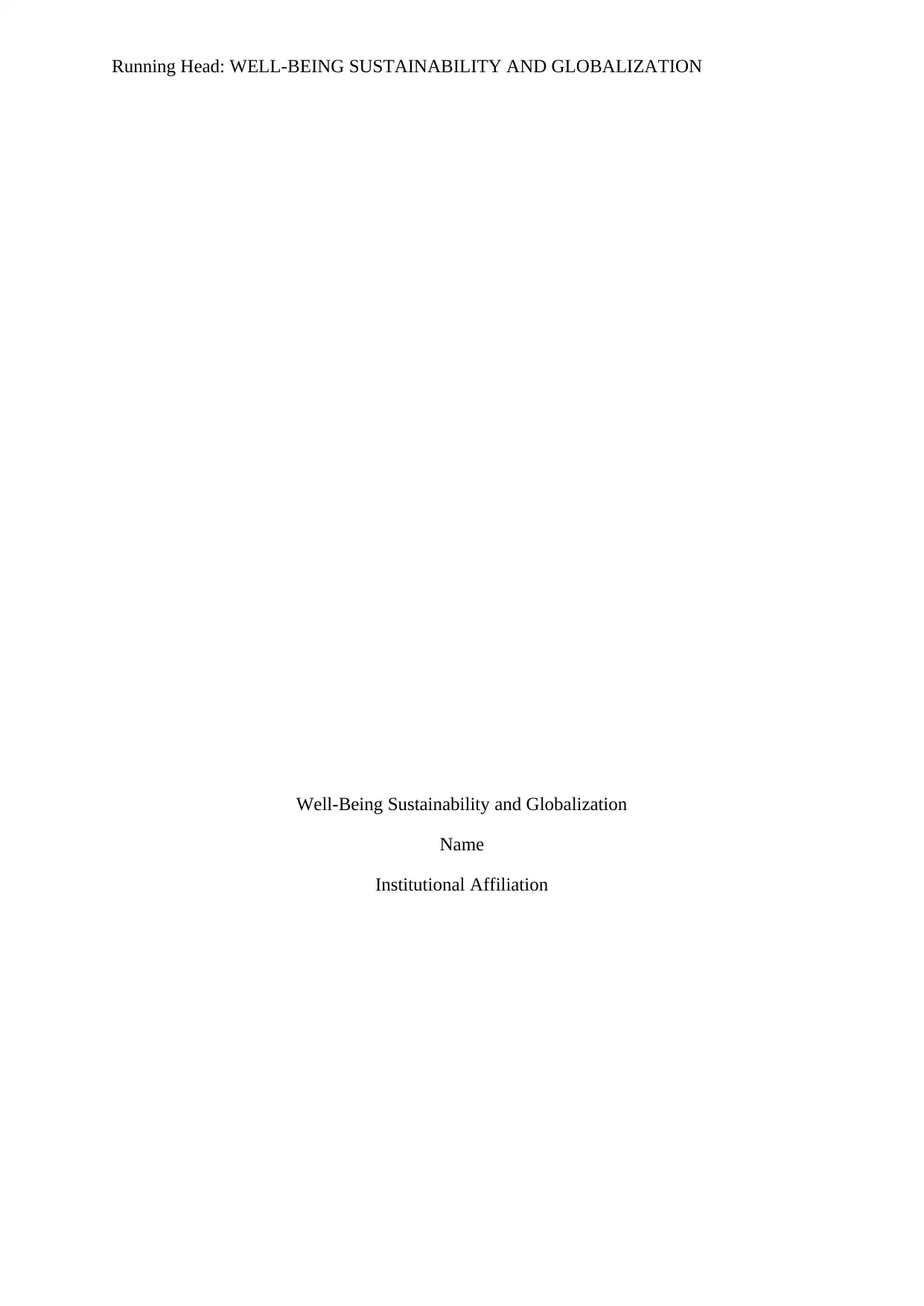
Running Head: WELL-BEING SUSTAINABILITY AND GLOBALIZATION
Well-Being Sustainability and Globalization
Name
Institutional Affiliation
Well-Being Sustainability and Globalization
Name
Institutional Affiliation
Secure Best Marks with AI Grader
Need help grading? Try our AI Grader for instant feedback on your assignments.
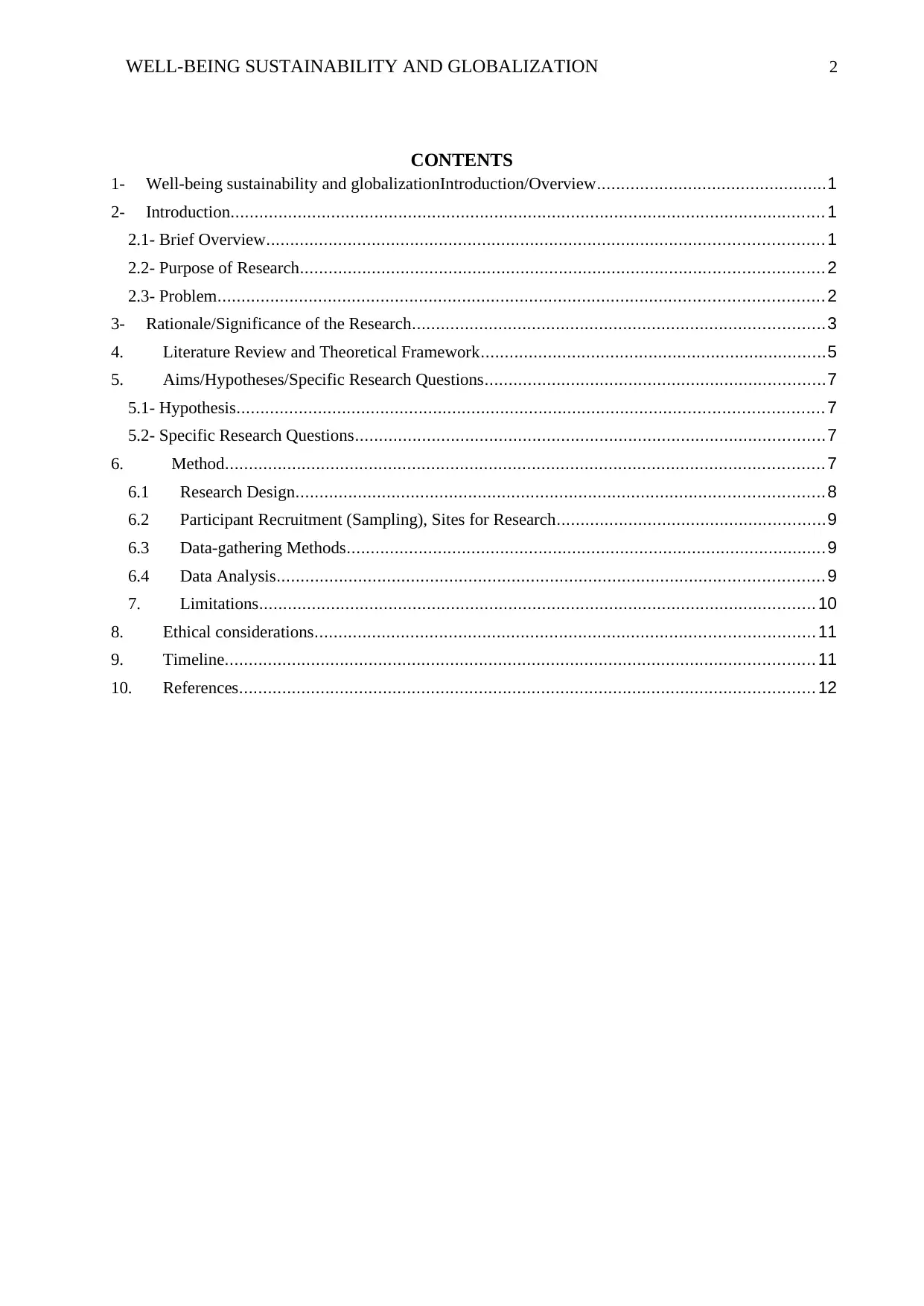
WELL-BEING SUSTAINABILITY AND GLOBALIZATION 2
CONTENTS
1- Well-being sustainability and globalizationIntroduction/Overview................................................1
2- Introduction............................................................................................................................ 1
2.1- Brief Overview.................................................................................................................... 1
2.2- Purpose of Research............................................................................................................. 2
2.3- Problem.............................................................................................................................. 2
3- Rationale/Significance of the Research......................................................................................3
4. Literature Review and Theoretical Framework........................................................................5
5. Aims/Hypotheses/Specific Research Questions.......................................................................7
5.1- Hypothesis.......................................................................................................................... 7
5.2- Specific Research Questions..................................................................................................7
6. Method............................................................................................................................. 7
6.1 Research Design..............................................................................................................8
6.2 Participant Recruitment (Sampling), Sites for Research........................................................9
6.3 Data-gathering Methods....................................................................................................9
6.4 Data Analysis..................................................................................................................9
7. Limitations.................................................................................................................... 10
8. Ethical considerations........................................................................................................11
9. Timeline........................................................................................................................... 11
10. References........................................................................................................................ 12
CONTENTS
1- Well-being sustainability and globalizationIntroduction/Overview................................................1
2- Introduction............................................................................................................................ 1
2.1- Brief Overview.................................................................................................................... 1
2.2- Purpose of Research............................................................................................................. 2
2.3- Problem.............................................................................................................................. 2
3- Rationale/Significance of the Research......................................................................................3
4. Literature Review and Theoretical Framework........................................................................5
5. Aims/Hypotheses/Specific Research Questions.......................................................................7
5.1- Hypothesis.......................................................................................................................... 7
5.2- Specific Research Questions..................................................................................................7
6. Method............................................................................................................................. 7
6.1 Research Design..............................................................................................................8
6.2 Participant Recruitment (Sampling), Sites for Research........................................................9
6.3 Data-gathering Methods....................................................................................................9
6.4 Data Analysis..................................................................................................................9
7. Limitations.................................................................................................................... 10
8. Ethical considerations........................................................................................................11
9. Timeline........................................................................................................................... 11
10. References........................................................................................................................ 12
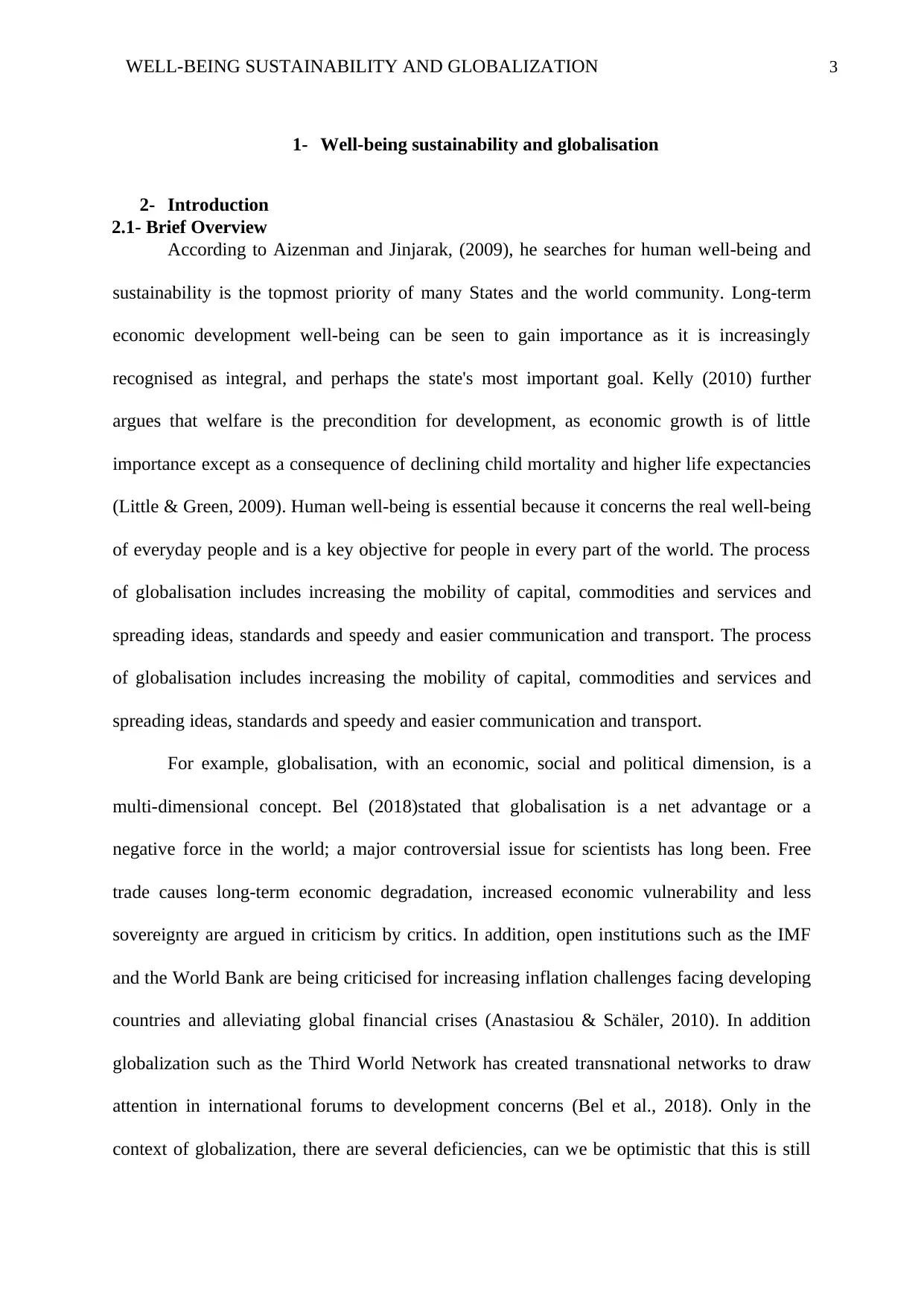
WELL-BEING SUSTAINABILITY AND GLOBALIZATION 3
1- Well-being sustainability and globalisation
2- Introduction
2.1- Brief Overview
According to Aizenman and Jinjarak, (2009), he searches for human well-being and
sustainability is the topmost priority of many States and the world community. Long-term
economic development well-being can be seen to gain importance as it is increasingly
recognised as integral, and perhaps the state's most important goal. Kelly (2010) further
argues that welfare is the precondition for development, as economic growth is of little
importance except as a consequence of declining child mortality and higher life expectancies
(Little & Green, 2009). Human well-being is essential because it concerns the real well-being
of everyday people and is a key objective for people in every part of the world. The process
of globalisation includes increasing the mobility of capital, commodities and services and
spreading ideas, standards and speedy and easier communication and transport. The process
of globalisation includes increasing the mobility of capital, commodities and services and
spreading ideas, standards and speedy and easier communication and transport.
For example, globalisation, with an economic, social and political dimension, is a
multi-dimensional concept. Bel (2018)stated that globalisation is a net advantage or a
negative force in the world; a major controversial issue for scientists has long been. Free
trade causes long-term economic degradation, increased economic vulnerability and less
sovereignty are argued in criticism by critics. In addition, open institutions such as the IMF
and the World Bank are being criticised for increasing inflation challenges facing developing
countries and alleviating global financial crises (Anastasiou & Schäler, 2010). In addition
globalization such as the Third World Network has created transnational networks to draw
attention in international forums to development concerns (Bel et al., 2018). Only in the
context of globalization, there are several deficiencies, can we be optimistic that this is still
1- Well-being sustainability and globalisation
2- Introduction
2.1- Brief Overview
According to Aizenman and Jinjarak, (2009), he searches for human well-being and
sustainability is the topmost priority of many States and the world community. Long-term
economic development well-being can be seen to gain importance as it is increasingly
recognised as integral, and perhaps the state's most important goal. Kelly (2010) further
argues that welfare is the precondition for development, as economic growth is of little
importance except as a consequence of declining child mortality and higher life expectancies
(Little & Green, 2009). Human well-being is essential because it concerns the real well-being
of everyday people and is a key objective for people in every part of the world. The process
of globalisation includes increasing the mobility of capital, commodities and services and
spreading ideas, standards and speedy and easier communication and transport. The process
of globalisation includes increasing the mobility of capital, commodities and services and
spreading ideas, standards and speedy and easier communication and transport.
For example, globalisation, with an economic, social and political dimension, is a
multi-dimensional concept. Bel (2018)stated that globalisation is a net advantage or a
negative force in the world; a major controversial issue for scientists has long been. Free
trade causes long-term economic degradation, increased economic vulnerability and less
sovereignty are argued in criticism by critics. In addition, open institutions such as the IMF
and the World Bank are being criticised for increasing inflation challenges facing developing
countries and alleviating global financial crises (Anastasiou & Schäler, 2010). In addition
globalization such as the Third World Network has created transnational networks to draw
attention in international forums to development concerns (Bel et al., 2018). Only in the
context of globalization, there are several deficiencies, can we be optimistic that this is still
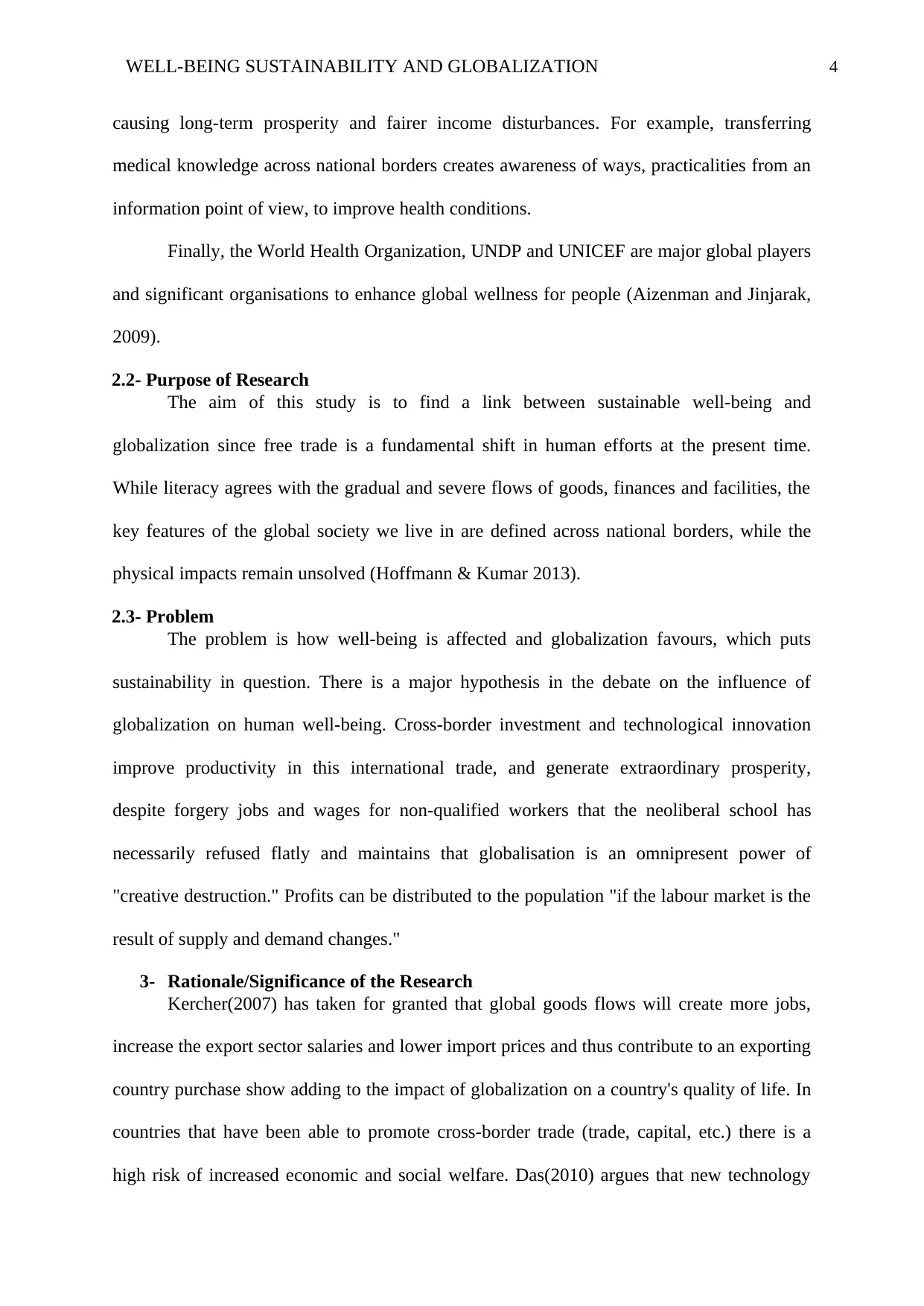
WELL-BEING SUSTAINABILITY AND GLOBALIZATION 4
causing long-term prosperity and fairer income disturbances. For example, transferring
medical knowledge across national borders creates awareness of ways, practicalities from an
information point of view, to improve health conditions.
Finally, the World Health Organization, UNDP and UNICEF are major global players
and significant organisations to enhance global wellness for people (Aizenman and Jinjarak,
2009).
2.2- Purpose of Research
The aim of this study is to find a link between sustainable well-being and
globalization since free trade is a fundamental shift in human efforts at the present time.
While literacy agrees with the gradual and severe flows of goods, finances and facilities, the
key features of the global society we live in are defined across national borders, while the
physical impacts remain unsolved (Hoffmann & Kumar 2013).
2.3- Problem
The problem is how well-being is affected and globalization favours, which puts
sustainability in question. There is a major hypothesis in the debate on the influence of
globalization on human well-being. Cross-border investment and technological innovation
improve productivity in this international trade, and generate extraordinary prosperity,
despite forgery jobs and wages for non-qualified workers that the neoliberal school has
necessarily refused flatly and maintains that globalisation is an omnipresent power of
"creative destruction." Profits can be distributed to the population "if the labour market is the
result of supply and demand changes."
3- Rationale/Significance of the Research
Kercher(2007) has taken for granted that global goods flows will create more jobs,
increase the export sector salaries and lower import prices and thus contribute to an exporting
country purchase show adding to the impact of globalization on a country's quality of life. In
countries that have been able to promote cross-border trade (trade, capital, etc.) there is a
high risk of increased economic and social welfare. Das(2010) argues that new technology
causing long-term prosperity and fairer income disturbances. For example, transferring
medical knowledge across national borders creates awareness of ways, practicalities from an
information point of view, to improve health conditions.
Finally, the World Health Organization, UNDP and UNICEF are major global players
and significant organisations to enhance global wellness for people (Aizenman and Jinjarak,
2009).
2.2- Purpose of Research
The aim of this study is to find a link between sustainable well-being and
globalization since free trade is a fundamental shift in human efforts at the present time.
While literacy agrees with the gradual and severe flows of goods, finances and facilities, the
key features of the global society we live in are defined across national borders, while the
physical impacts remain unsolved (Hoffmann & Kumar 2013).
2.3- Problem
The problem is how well-being is affected and globalization favours, which puts
sustainability in question. There is a major hypothesis in the debate on the influence of
globalization on human well-being. Cross-border investment and technological innovation
improve productivity in this international trade, and generate extraordinary prosperity,
despite forgery jobs and wages for non-qualified workers that the neoliberal school has
necessarily refused flatly and maintains that globalisation is an omnipresent power of
"creative destruction." Profits can be distributed to the population "if the labour market is the
result of supply and demand changes."
3- Rationale/Significance of the Research
Kercher(2007) has taken for granted that global goods flows will create more jobs,
increase the export sector salaries and lower import prices and thus contribute to an exporting
country purchase show adding to the impact of globalization on a country's quality of life. In
countries that have been able to promote cross-border trade (trade, capital, etc.) there is a
high risk of increased economic and social welfare. Das(2010) argues that new technology
Secure Best Marks with AI Grader
Need help grading? Try our AI Grader for instant feedback on your assignments.
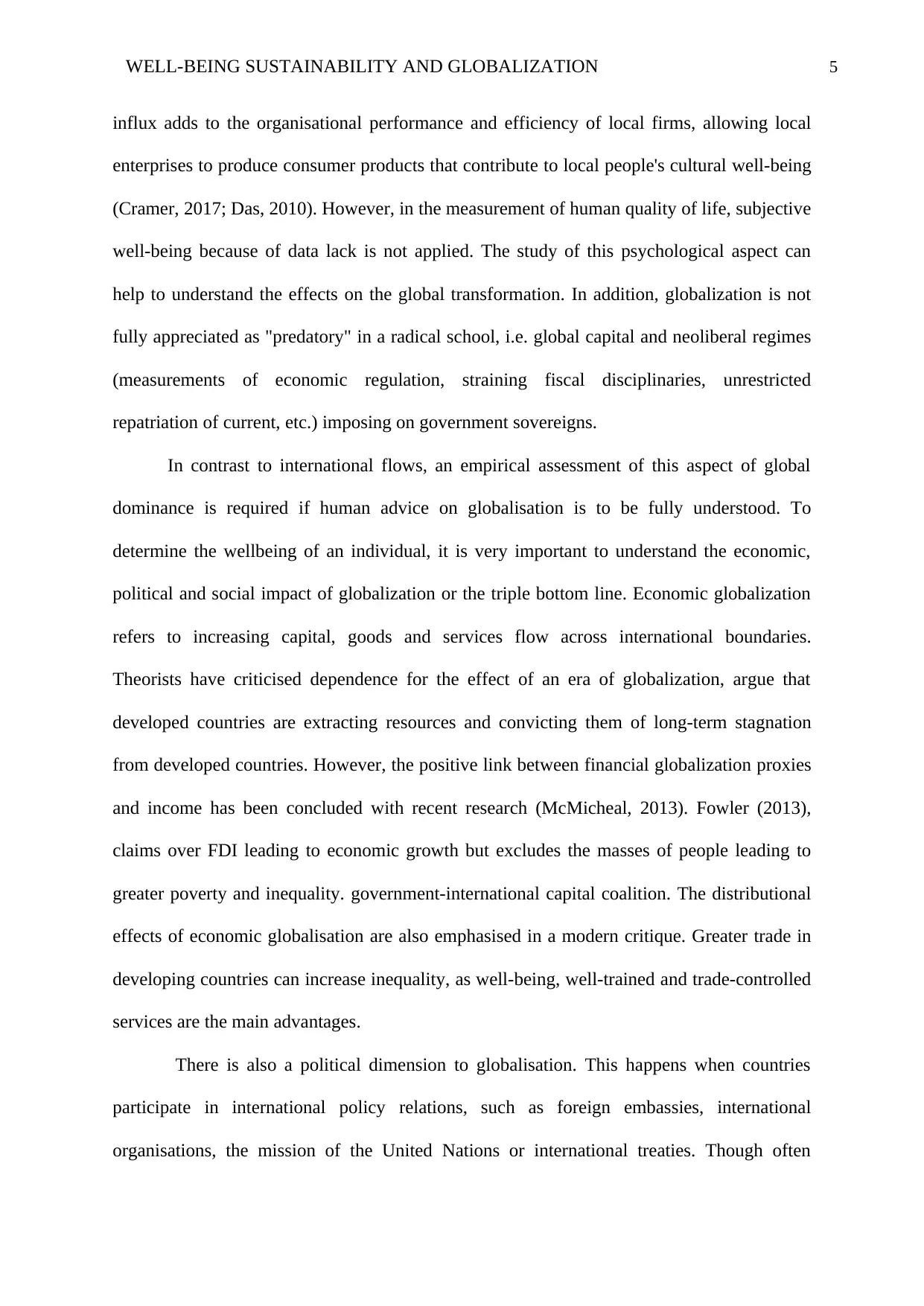
WELL-BEING SUSTAINABILITY AND GLOBALIZATION 5
influx adds to the organisational performance and efficiency of local firms, allowing local
enterprises to produce consumer products that contribute to local people's cultural well-being
(Cramer, 2017; Das, 2010). However, in the measurement of human quality of life, subjective
well-being because of data lack is not applied. The study of this psychological aspect can
help to understand the effects on the global transformation. In addition, globalization is not
fully appreciated as "predatory" in a radical school, i.e. global capital and neoliberal regimes
(measurements of economic regulation, straining fiscal disciplinaries, unrestricted
repatriation of current, etc.) imposing on government sovereigns.
In contrast to international flows, an empirical assessment of this aspect of global
dominance is required if human advice on globalisation is to be fully understood. To
determine the wellbeing of an individual, it is very important to understand the economic,
political and social impact of globalization or the triple bottom line. Economic globalization
refers to increasing capital, goods and services flow across international boundaries.
Theorists have criticised dependence for the effect of an era of globalization, argue that
developed countries are extracting resources and convicting them of long-term stagnation
from developed countries. However, the positive link between financial globalization proxies
and income has been concluded with recent research (McMicheal, 2013). Fowler (2013),
claims over FDI leading to economic growth but excludes the masses of people leading to
greater poverty and inequality. government-international capital coalition. The distributional
effects of economic globalisation are also emphasised in a modern critique. Greater trade in
developing countries can increase inequality, as well-being, well-trained and trade-controlled
services are the main advantages.
There is also a political dimension to globalisation. This happens when countries
participate in international policy relations, such as foreign embassies, international
organisations, the mission of the United Nations or international treaties. Though often
influx adds to the organisational performance and efficiency of local firms, allowing local
enterprises to produce consumer products that contribute to local people's cultural well-being
(Cramer, 2017; Das, 2010). However, in the measurement of human quality of life, subjective
well-being because of data lack is not applied. The study of this psychological aspect can
help to understand the effects on the global transformation. In addition, globalization is not
fully appreciated as "predatory" in a radical school, i.e. global capital and neoliberal regimes
(measurements of economic regulation, straining fiscal disciplinaries, unrestricted
repatriation of current, etc.) imposing on government sovereigns.
In contrast to international flows, an empirical assessment of this aspect of global
dominance is required if human advice on globalisation is to be fully understood. To
determine the wellbeing of an individual, it is very important to understand the economic,
political and social impact of globalization or the triple bottom line. Economic globalization
refers to increasing capital, goods and services flow across international boundaries.
Theorists have criticised dependence for the effect of an era of globalization, argue that
developed countries are extracting resources and convicting them of long-term stagnation
from developed countries. However, the positive link between financial globalization proxies
and income has been concluded with recent research (McMicheal, 2013). Fowler (2013),
claims over FDI leading to economic growth but excludes the masses of people leading to
greater poverty and inequality. government-international capital coalition. The distributional
effects of economic globalisation are also emphasised in a modern critique. Greater trade in
developing countries can increase inequality, as well-being, well-trained and trade-controlled
services are the main advantages.
There is also a political dimension to globalisation. This happens when countries
participate in international policy relations, such as foreign embassies, international
organisations, the mission of the United Nations or international treaties. Though often
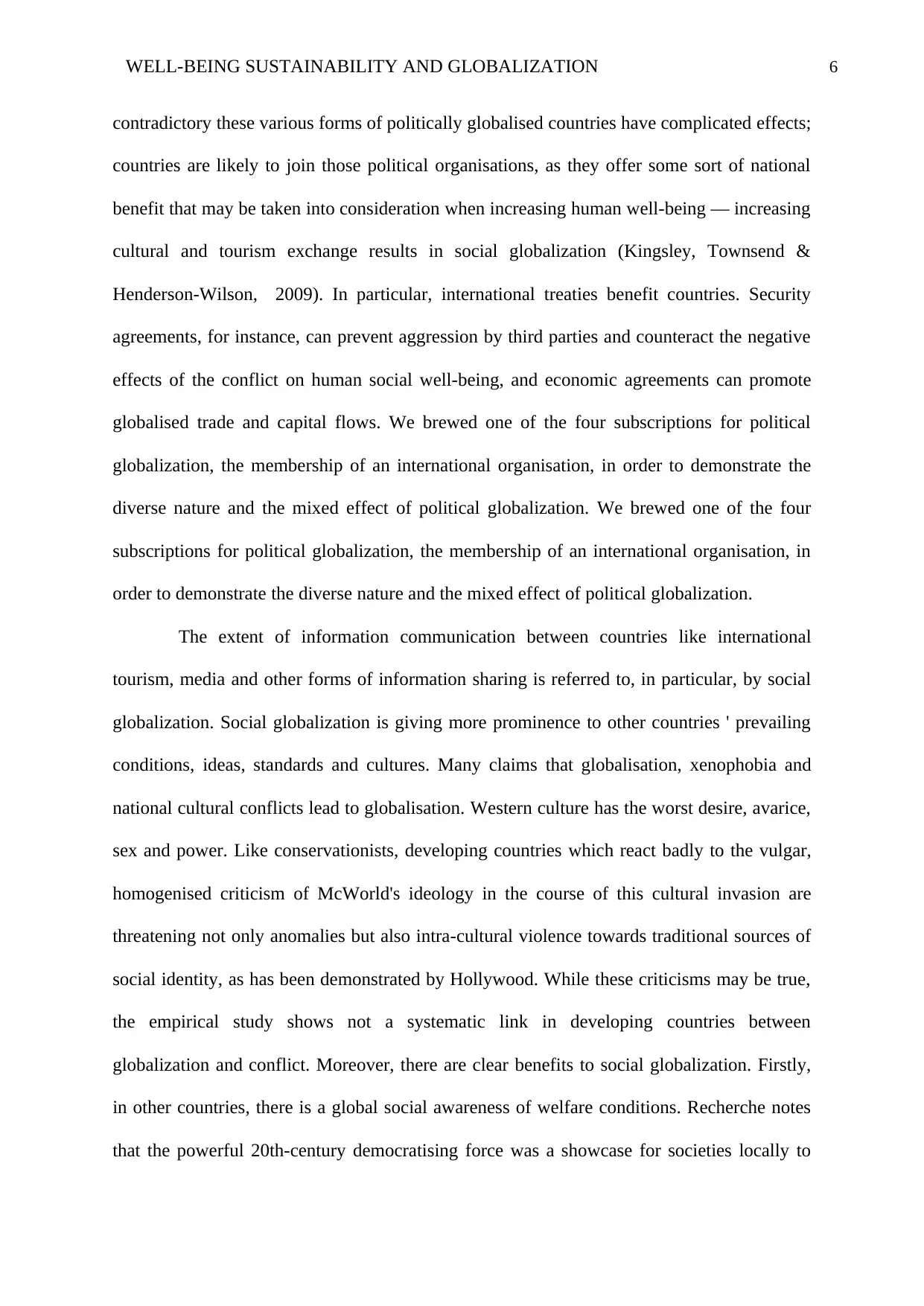
WELL-BEING SUSTAINABILITY AND GLOBALIZATION 6
contradictory these various forms of politically globalised countries have complicated effects;
countries are likely to join those political organisations, as they offer some sort of national
benefit that may be taken into consideration when increasing human well-being — increasing
cultural and tourism exchange results in social globalization (Kingsley, Townsend &
Henderson‐Wilson, 2009). In particular, international treaties benefit countries. Security
agreements, for instance, can prevent aggression by third parties and counteract the negative
effects of the conflict on human social well-being, and economic agreements can promote
globalised trade and capital flows. We brewed one of the four subscriptions for political
globalization, the membership of an international organisation, in order to demonstrate the
diverse nature and the mixed effect of political globalization. We brewed one of the four
subscriptions for political globalization, the membership of an international organisation, in
order to demonstrate the diverse nature and the mixed effect of political globalization.
The extent of information communication between countries like international
tourism, media and other forms of information sharing is referred to, in particular, by social
globalization. Social globalization is giving more prominence to other countries ' prevailing
conditions, ideas, standards and cultures. Many claims that globalisation, xenophobia and
national cultural conflicts lead to globalisation. Western culture has the worst desire, avarice,
sex and power. Like conservationists, developing countries which react badly to the vulgar,
homogenised criticism of McWorld's ideology in the course of this cultural invasion are
threatening not only anomalies but also intra-cultural violence towards traditional sources of
social identity, as has been demonstrated by Hollywood. While these criticisms may be true,
the empirical study shows not a systematic link in developing countries between
globalization and conflict. Moreover, there are clear benefits to social globalization. Firstly,
in other countries, there is a global social awareness of welfare conditions. Recherche notes
that the powerful 20th-century democratising force was a showcase for societies locally to
contradictory these various forms of politically globalised countries have complicated effects;
countries are likely to join those political organisations, as they offer some sort of national
benefit that may be taken into consideration when increasing human well-being — increasing
cultural and tourism exchange results in social globalization (Kingsley, Townsend &
Henderson‐Wilson, 2009). In particular, international treaties benefit countries. Security
agreements, for instance, can prevent aggression by third parties and counteract the negative
effects of the conflict on human social well-being, and economic agreements can promote
globalised trade and capital flows. We brewed one of the four subscriptions for political
globalization, the membership of an international organisation, in order to demonstrate the
diverse nature and the mixed effect of political globalization. We brewed one of the four
subscriptions for political globalization, the membership of an international organisation, in
order to demonstrate the diverse nature and the mixed effect of political globalization.
The extent of information communication between countries like international
tourism, media and other forms of information sharing is referred to, in particular, by social
globalization. Social globalization is giving more prominence to other countries ' prevailing
conditions, ideas, standards and cultures. Many claims that globalisation, xenophobia and
national cultural conflicts lead to globalisation. Western culture has the worst desire, avarice,
sex and power. Like conservationists, developing countries which react badly to the vulgar,
homogenised criticism of McWorld's ideology in the course of this cultural invasion are
threatening not only anomalies but also intra-cultural violence towards traditional sources of
social identity, as has been demonstrated by Hollywood. While these criticisms may be true,
the empirical study shows not a systematic link in developing countries between
globalization and conflict. Moreover, there are clear benefits to social globalization. Firstly,
in other countries, there is a global social awareness of welfare conditions. Recherche notes
that the powerful 20th-century democratising force was a showcase for societies locally to
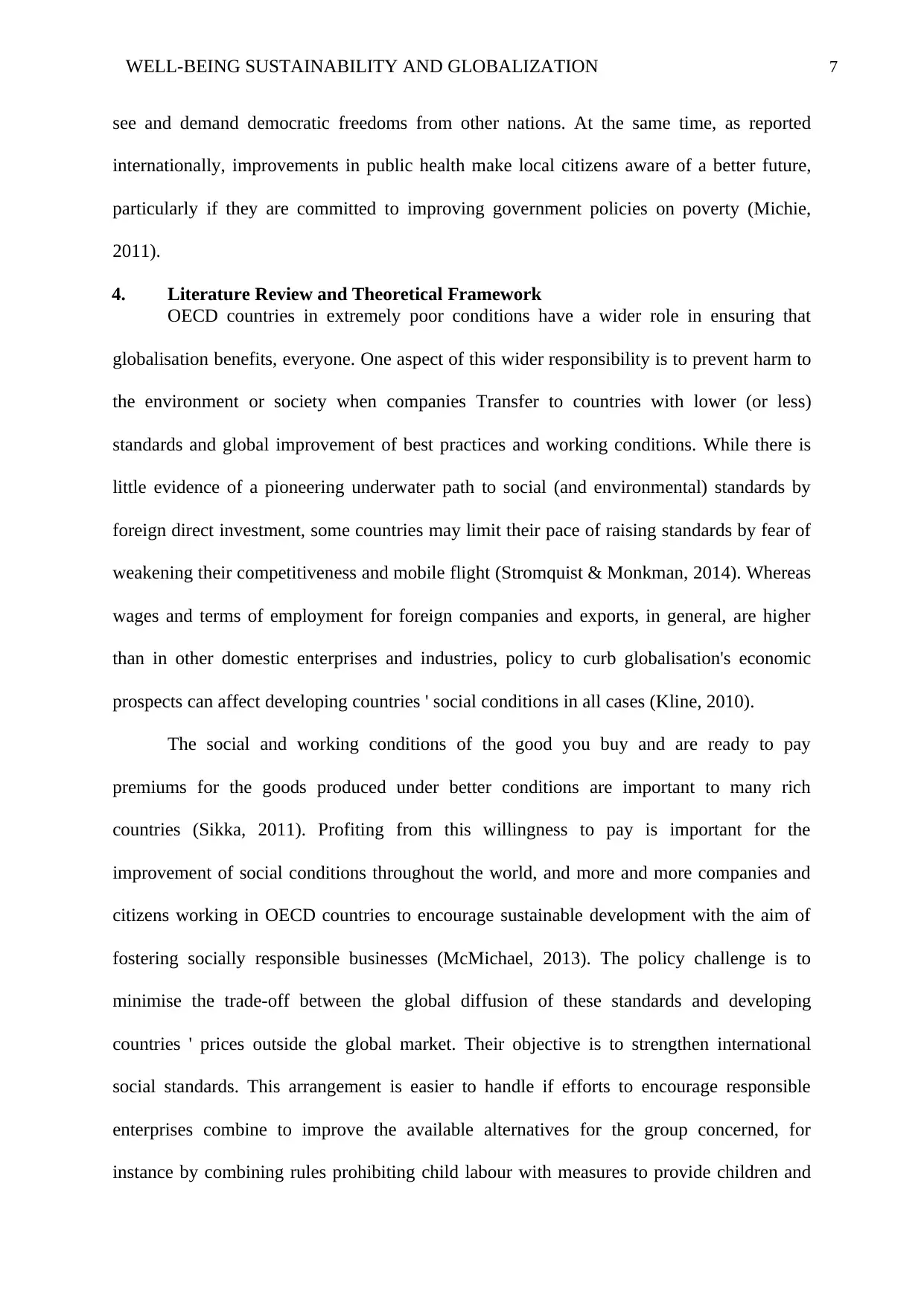
WELL-BEING SUSTAINABILITY AND GLOBALIZATION 7
see and demand democratic freedoms from other nations. At the same time, as reported
internationally, improvements in public health make local citizens aware of a better future,
particularly if they are committed to improving government policies on poverty (Michie,
2011).
4. Literature Review and Theoretical Framework
OECD countries in extremely poor conditions have a wider role in ensuring that
globalisation benefits, everyone. One aspect of this wider responsibility is to prevent harm to
the environment or society when companies Transfer to countries with lower (or less)
standards and global improvement of best practices and working conditions. While there is
little evidence of a pioneering underwater path to social (and environmental) standards by
foreign direct investment, some countries may limit their pace of raising standards by fear of
weakening their competitiveness and mobile flight (Stromquist & Monkman, 2014). Whereas
wages and terms of employment for foreign companies and exports, in general, are higher
than in other domestic enterprises and industries, policy to curb globalisation's economic
prospects can affect developing countries ' social conditions in all cases (Kline, 2010).
The social and working conditions of the good you buy and are ready to pay
premiums for the goods produced under better conditions are important to many rich
countries (Sikka, 2011). Profiting from this willingness to pay is important for the
improvement of social conditions throughout the world, and more and more companies and
citizens working in OECD countries to encourage sustainable development with the aim of
fostering socially responsible businesses (McMichael, 2013). The policy challenge is to
minimise the trade-off between the global diffusion of these standards and developing
countries ' prices outside the global market. Their objective is to strengthen international
social standards. This arrangement is easier to handle if efforts to encourage responsible
enterprises combine to improve the available alternatives for the group concerned, for
instance by combining rules prohibiting child labour with measures to provide children and
see and demand democratic freedoms from other nations. At the same time, as reported
internationally, improvements in public health make local citizens aware of a better future,
particularly if they are committed to improving government policies on poverty (Michie,
2011).
4. Literature Review and Theoretical Framework
OECD countries in extremely poor conditions have a wider role in ensuring that
globalisation benefits, everyone. One aspect of this wider responsibility is to prevent harm to
the environment or society when companies Transfer to countries with lower (or less)
standards and global improvement of best practices and working conditions. While there is
little evidence of a pioneering underwater path to social (and environmental) standards by
foreign direct investment, some countries may limit their pace of raising standards by fear of
weakening their competitiveness and mobile flight (Stromquist & Monkman, 2014). Whereas
wages and terms of employment for foreign companies and exports, in general, are higher
than in other domestic enterprises and industries, policy to curb globalisation's economic
prospects can affect developing countries ' social conditions in all cases (Kline, 2010).
The social and working conditions of the good you buy and are ready to pay
premiums for the goods produced under better conditions are important to many rich
countries (Sikka, 2011). Profiting from this willingness to pay is important for the
improvement of social conditions throughout the world, and more and more companies and
citizens working in OECD countries to encourage sustainable development with the aim of
fostering socially responsible businesses (McMichael, 2013). The policy challenge is to
minimise the trade-off between the global diffusion of these standards and developing
countries ' prices outside the global market. Their objective is to strengthen international
social standards. This arrangement is easier to handle if efforts to encourage responsible
enterprises combine to improve the available alternatives for the group concerned, for
instance by combining rules prohibiting child labour with measures to provide children and
Paraphrase This Document
Need a fresh take? Get an instant paraphrase of this document with our AI Paraphraser
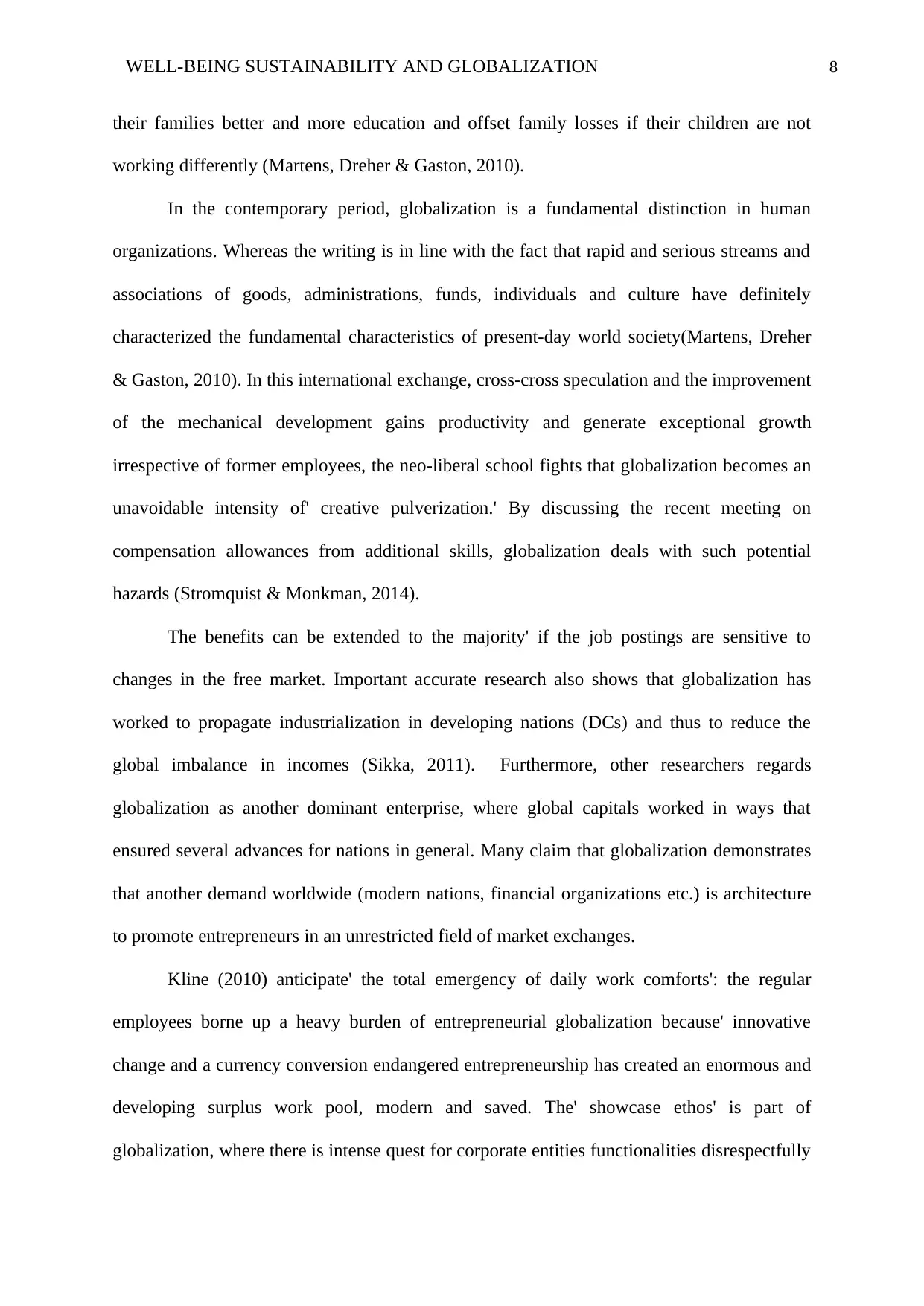
WELL-BEING SUSTAINABILITY AND GLOBALIZATION 8
their families better and more education and offset family losses if their children are not
working differently (Martens, Dreher & Gaston, 2010).
In the contemporary period, globalization is a fundamental distinction in human
organizations. Whereas the writing is in line with the fact that rapid and serious streams and
associations of goods, administrations, funds, individuals and culture have definitely
characterized the fundamental characteristics of present-day world society(Martens, Dreher
& Gaston, 2010). In this international exchange, cross-cross speculation and the improvement
of the mechanical development gains productivity and generate exceptional growth
irrespective of former employees, the neo-liberal school fights that globalization becomes an
unavoidable intensity of' creative pulverization.' By discussing the recent meeting on
compensation allowances from additional skills, globalization deals with such potential
hazards (Stromquist & Monkman, 2014).
The benefits can be extended to the majority' if the job postings are sensitive to
changes in the free market. Important accurate research also shows that globalization has
worked to propagate industrialization in developing nations (DCs) and thus to reduce the
global imbalance in incomes (Sikka, 2011). Furthermore, other researchers regards
globalization as another dominant enterprise, where global capitals worked in ways that
ensured several advances for nations in general. Many claim that globalization demonstrates
that another demand worldwide (modern nations, financial organizations etc.) is architecture
to promote entrepreneurs in an unrestricted field of market exchanges.
Kline (2010) anticipate' the total emergency of daily work comforts': the regular
employees borne up a heavy burden of entrepreneurial globalization because' innovative
change and a currency conversion endangered entrepreneurship has created an enormous and
developing surplus work pool, modern and saved. The' showcase ethos' is part of
globalization, where there is intense quest for corporate entities functionalities disrespectfully
their families better and more education and offset family losses if their children are not
working differently (Martens, Dreher & Gaston, 2010).
In the contemporary period, globalization is a fundamental distinction in human
organizations. Whereas the writing is in line with the fact that rapid and serious streams and
associations of goods, administrations, funds, individuals and culture have definitely
characterized the fundamental characteristics of present-day world society(Martens, Dreher
& Gaston, 2010). In this international exchange, cross-cross speculation and the improvement
of the mechanical development gains productivity and generate exceptional growth
irrespective of former employees, the neo-liberal school fights that globalization becomes an
unavoidable intensity of' creative pulverization.' By discussing the recent meeting on
compensation allowances from additional skills, globalization deals with such potential
hazards (Stromquist & Monkman, 2014).
The benefits can be extended to the majority' if the job postings are sensitive to
changes in the free market. Important accurate research also shows that globalization has
worked to propagate industrialization in developing nations (DCs) and thus to reduce the
global imbalance in incomes (Sikka, 2011). Furthermore, other researchers regards
globalization as another dominant enterprise, where global capitals worked in ways that
ensured several advances for nations in general. Many claim that globalization demonstrates
that another demand worldwide (modern nations, financial organizations etc.) is architecture
to promote entrepreneurs in an unrestricted field of market exchanges.
Kline (2010) anticipate' the total emergency of daily work comforts': the regular
employees borne up a heavy burden of entrepreneurial globalization because' innovative
change and a currency conversion endangered entrepreneurship has created an enormous and
developing surplus work pool, modern and saved. The' showcase ethos' is part of
globalization, where there is intense quest for corporate entities functionalities disrespectfully
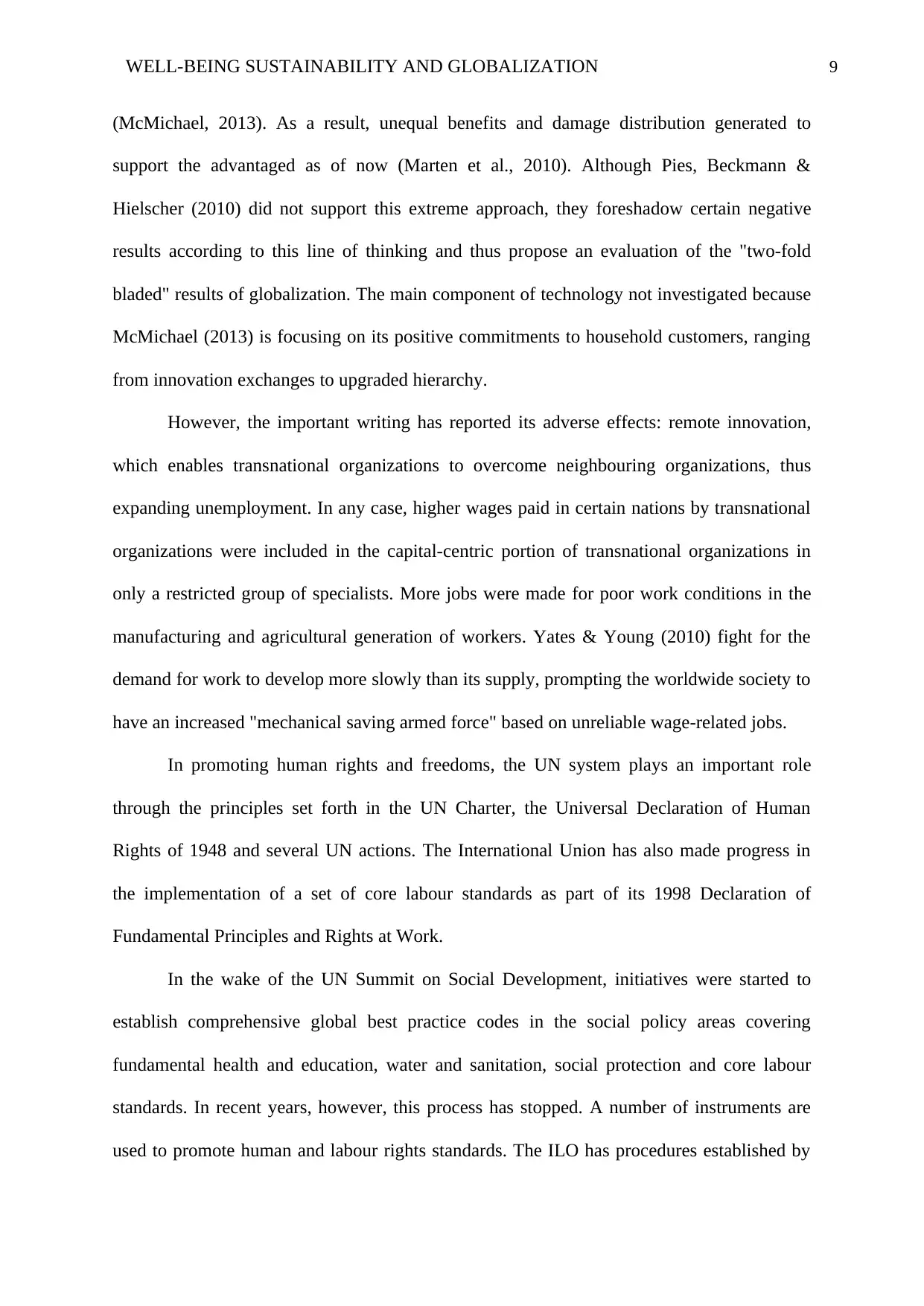
WELL-BEING SUSTAINABILITY AND GLOBALIZATION 9
(McMichael, 2013). As a result, unequal benefits and damage distribution generated to
support the advantaged as of now (Marten et al., 2010). Although Pies, Beckmann &
Hielscher (2010) did not support this extreme approach, they foreshadow certain negative
results according to this line of thinking and thus propose an evaluation of the "two-fold
bladed" results of globalization. The main component of technology not investigated because
McMichael (2013) is focusing on its positive commitments to household customers, ranging
from innovation exchanges to upgraded hierarchy.
However, the important writing has reported its adverse effects: remote innovation,
which enables transnational organizations to overcome neighbouring organizations, thus
expanding unemployment. In any case, higher wages paid in certain nations by transnational
organizations were included in the capital-centric portion of transnational organizations in
only a restricted group of specialists. More jobs were made for poor work conditions in the
manufacturing and agricultural generation of workers. Yates & Young (2010) fight for the
demand for work to develop more slowly than its supply, prompting the worldwide society to
have an increased "mechanical saving armed force" based on unreliable wage-related jobs.
In promoting human rights and freedoms, the UN system plays an important role
through the principles set forth in the UN Charter, the Universal Declaration of Human
Rights of 1948 and several UN actions. The International Union has also made progress in
the implementation of a set of core labour standards as part of its 1998 Declaration of
Fundamental Principles and Rights at Work.
In the wake of the UN Summit on Social Development, initiatives were started to
establish comprehensive global best practice codes in the social policy areas covering
fundamental health and education, water and sanitation, social protection and core labour
standards. In recent years, however, this process has stopped. A number of instruments are
used to promote human and labour rights standards. The ILO has procedures established by
(McMichael, 2013). As a result, unequal benefits and damage distribution generated to
support the advantaged as of now (Marten et al., 2010). Although Pies, Beckmann &
Hielscher (2010) did not support this extreme approach, they foreshadow certain negative
results according to this line of thinking and thus propose an evaluation of the "two-fold
bladed" results of globalization. The main component of technology not investigated because
McMichael (2013) is focusing on its positive commitments to household customers, ranging
from innovation exchanges to upgraded hierarchy.
However, the important writing has reported its adverse effects: remote innovation,
which enables transnational organizations to overcome neighbouring organizations, thus
expanding unemployment. In any case, higher wages paid in certain nations by transnational
organizations were included in the capital-centric portion of transnational organizations in
only a restricted group of specialists. More jobs were made for poor work conditions in the
manufacturing and agricultural generation of workers. Yates & Young (2010) fight for the
demand for work to develop more slowly than its supply, prompting the worldwide society to
have an increased "mechanical saving armed force" based on unreliable wage-related jobs.
In promoting human rights and freedoms, the UN system plays an important role
through the principles set forth in the UN Charter, the Universal Declaration of Human
Rights of 1948 and several UN actions. The International Union has also made progress in
the implementation of a set of core labour standards as part of its 1998 Declaration of
Fundamental Principles and Rights at Work.
In the wake of the UN Summit on Social Development, initiatives were started to
establish comprehensive global best practice codes in the social policy areas covering
fundamental health and education, water and sanitation, social protection and core labour
standards. In recent years, however, this process has stopped. A number of instruments are
used to promote human and labour rights standards. The ILO has procedures established by
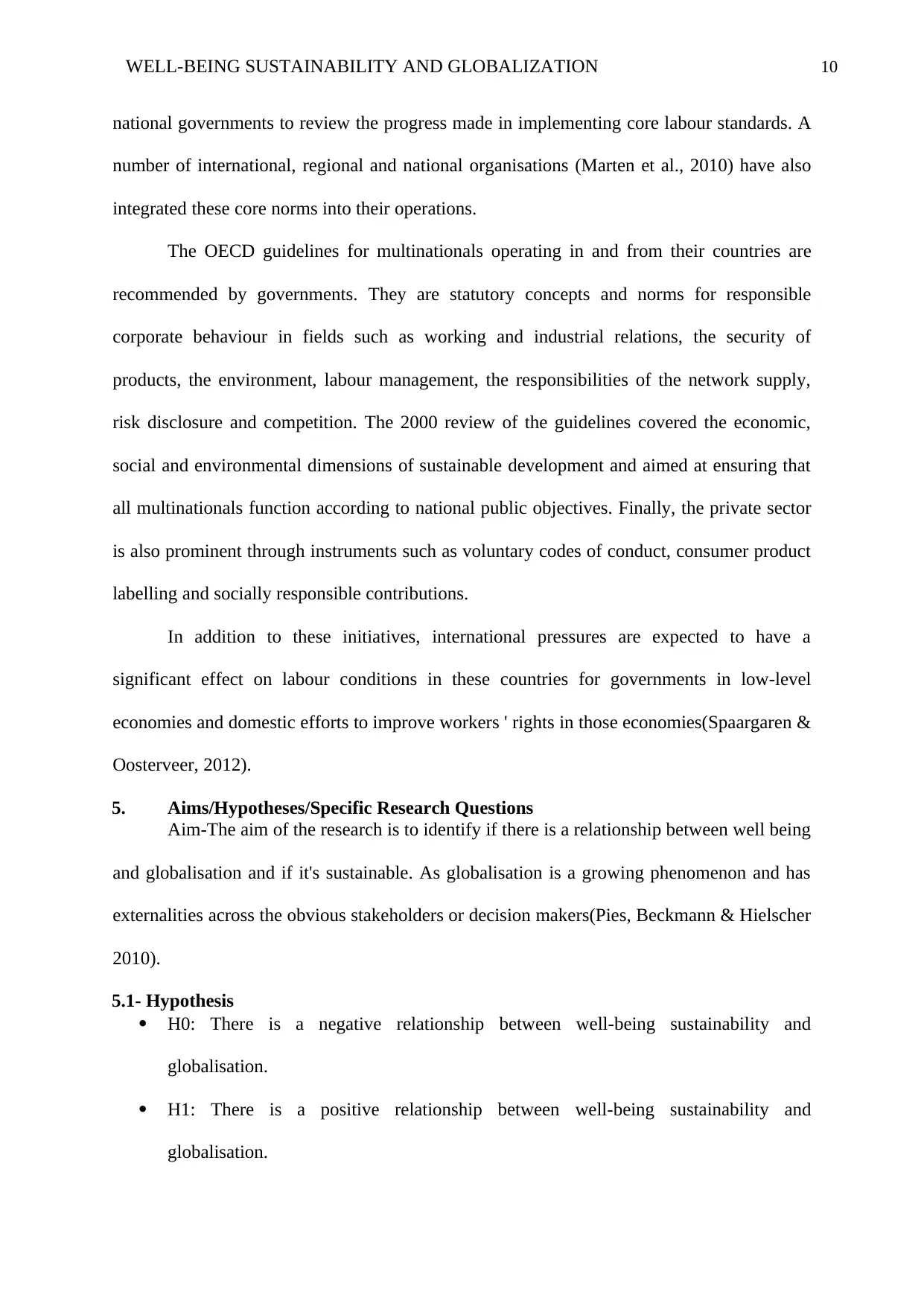
WELL-BEING SUSTAINABILITY AND GLOBALIZATION 10
national governments to review the progress made in implementing core labour standards. A
number of international, regional and national organisations (Marten et al., 2010) have also
integrated these core norms into their operations.
The OECD guidelines for multinationals operating in and from their countries are
recommended by governments. They are statutory concepts and norms for responsible
corporate behaviour in fields such as working and industrial relations, the security of
products, the environment, labour management, the responsibilities of the network supply,
risk disclosure and competition. The 2000 review of the guidelines covered the economic,
social and environmental dimensions of sustainable development and aimed at ensuring that
all multinationals function according to national public objectives. Finally, the private sector
is also prominent through instruments such as voluntary codes of conduct, consumer product
labelling and socially responsible contributions.
In addition to these initiatives, international pressures are expected to have a
significant effect on labour conditions in these countries for governments in low-level
economies and domestic efforts to improve workers ' rights in those economies(Spaargaren &
Oosterveer, 2012).
5. Aims/Hypotheses/Specific Research Questions
Aim-The aim of the research is to identify if there is a relationship between well being
and globalisation and if it's sustainable. As globalisation is a growing phenomenon and has
externalities across the obvious stakeholders or decision makers(Pies, Beckmann & Hielscher
2010).
5.1- Hypothesis
H0: There is a negative relationship between well-being sustainability and
globalisation.
H1: There is a positive relationship between well-being sustainability and
globalisation.
national governments to review the progress made in implementing core labour standards. A
number of international, regional and national organisations (Marten et al., 2010) have also
integrated these core norms into their operations.
The OECD guidelines for multinationals operating in and from their countries are
recommended by governments. They are statutory concepts and norms for responsible
corporate behaviour in fields such as working and industrial relations, the security of
products, the environment, labour management, the responsibilities of the network supply,
risk disclosure and competition. The 2000 review of the guidelines covered the economic,
social and environmental dimensions of sustainable development and aimed at ensuring that
all multinationals function according to national public objectives. Finally, the private sector
is also prominent through instruments such as voluntary codes of conduct, consumer product
labelling and socially responsible contributions.
In addition to these initiatives, international pressures are expected to have a
significant effect on labour conditions in these countries for governments in low-level
economies and domestic efforts to improve workers ' rights in those economies(Spaargaren &
Oosterveer, 2012).
5. Aims/Hypotheses/Specific Research Questions
Aim-The aim of the research is to identify if there is a relationship between well being
and globalisation and if it's sustainable. As globalisation is a growing phenomenon and has
externalities across the obvious stakeholders or decision makers(Pies, Beckmann & Hielscher
2010).
5.1- Hypothesis
H0: There is a negative relationship between well-being sustainability and
globalisation.
H1: There is a positive relationship between well-being sustainability and
globalisation.
Secure Best Marks with AI Grader
Need help grading? Try our AI Grader for instant feedback on your assignments.
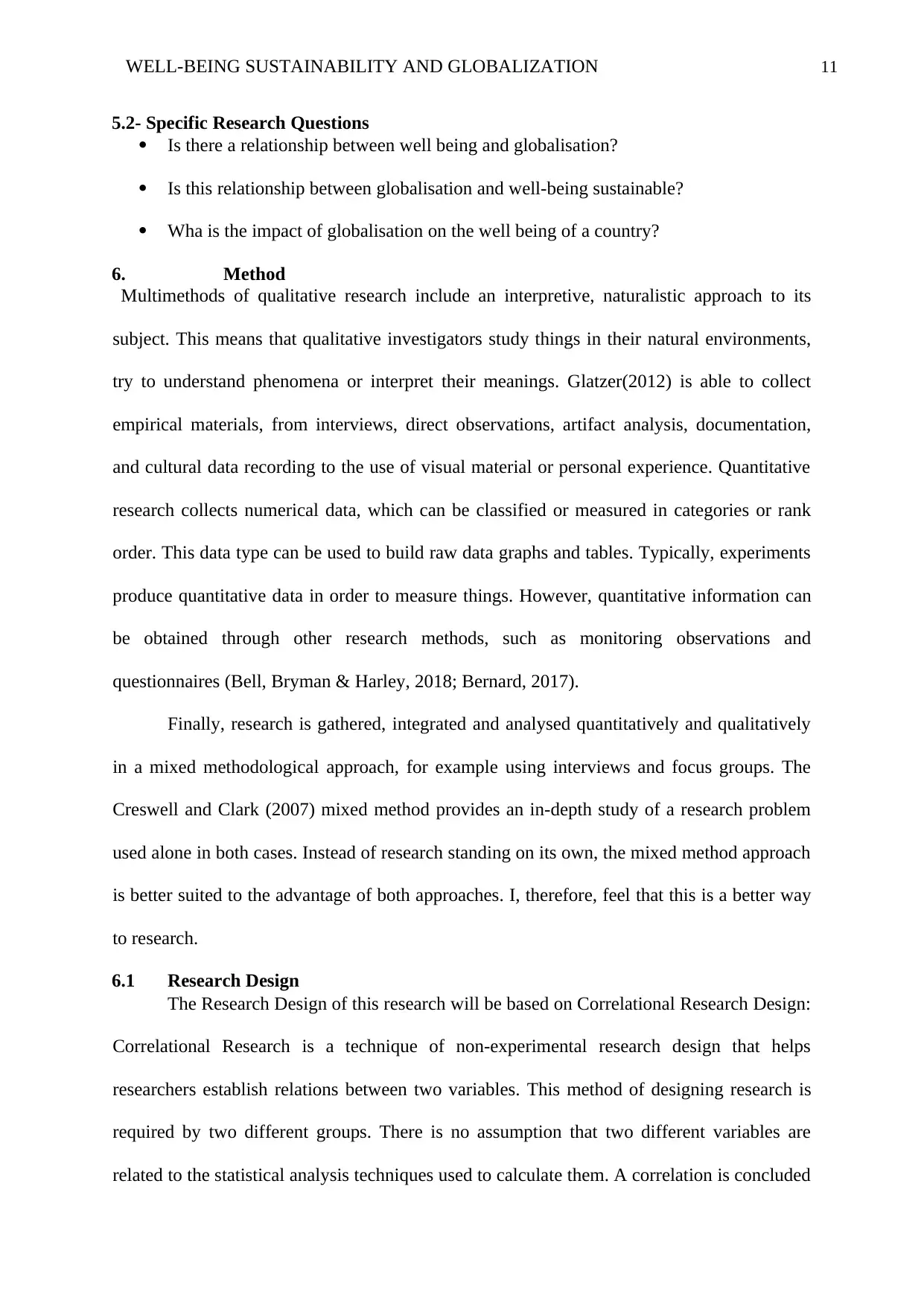
WELL-BEING SUSTAINABILITY AND GLOBALIZATION 11
5.2- Specific Research Questions
Is there a relationship between well being and globalisation?
Is this relationship between globalisation and well-being sustainable?
Wha is the impact of globalisation on the well being of a country?
6. Method
Multimethods of qualitative research include an interpretive, naturalistic approach to its
subject. This means that qualitative investigators study things in their natural environments,
try to understand phenomena or interpret their meanings. Glatzer(2012) is able to collect
empirical materials, from interviews, direct observations, artifact analysis, documentation,
and cultural data recording to the use of visual material or personal experience. Quantitative
research collects numerical data, which can be classified or measured in categories or rank
order. This data type can be used to build raw data graphs and tables. Typically, experiments
produce quantitative data in order to measure things. However, quantitative information can
be obtained through other research methods, such as monitoring observations and
questionnaires (Bell, Bryman & Harley, 2018; Bernard, 2017).
Finally, research is gathered, integrated and analysed quantitatively and qualitatively
in a mixed methodological approach, for example using interviews and focus groups. The
Creswell and Clark (2007) mixed method provides an in-depth study of a research problem
used alone in both cases. Instead of research standing on its own, the mixed method approach
is better suited to the advantage of both approaches. I, therefore, feel that this is a better way
to research.
6.1 Research Design
The Research Design of this research will be based on Correlational Research Design:
Correlational Research is a technique of non-experimental research design that helps
researchers establish relations between two variables. This method of designing research is
required by two different groups. There is no assumption that two different variables are
related to the statistical analysis techniques used to calculate them. A correlation is concluded
5.2- Specific Research Questions
Is there a relationship between well being and globalisation?
Is this relationship between globalisation and well-being sustainable?
Wha is the impact of globalisation on the well being of a country?
6. Method
Multimethods of qualitative research include an interpretive, naturalistic approach to its
subject. This means that qualitative investigators study things in their natural environments,
try to understand phenomena or interpret their meanings. Glatzer(2012) is able to collect
empirical materials, from interviews, direct observations, artifact analysis, documentation,
and cultural data recording to the use of visual material or personal experience. Quantitative
research collects numerical data, which can be classified or measured in categories or rank
order. This data type can be used to build raw data graphs and tables. Typically, experiments
produce quantitative data in order to measure things. However, quantitative information can
be obtained through other research methods, such as monitoring observations and
questionnaires (Bell, Bryman & Harley, 2018; Bernard, 2017).
Finally, research is gathered, integrated and analysed quantitatively and qualitatively
in a mixed methodological approach, for example using interviews and focus groups. The
Creswell and Clark (2007) mixed method provides an in-depth study of a research problem
used alone in both cases. Instead of research standing on its own, the mixed method approach
is better suited to the advantage of both approaches. I, therefore, feel that this is a better way
to research.
6.1 Research Design
The Research Design of this research will be based on Correlational Research Design:
Correlational Research is a technique of non-experimental research design that helps
researchers establish relations between two variables. This method of designing research is
required by two different groups. There is no assumption that two different variables are
related to the statistical analysis techniques used to calculate them. A correlation is concluded
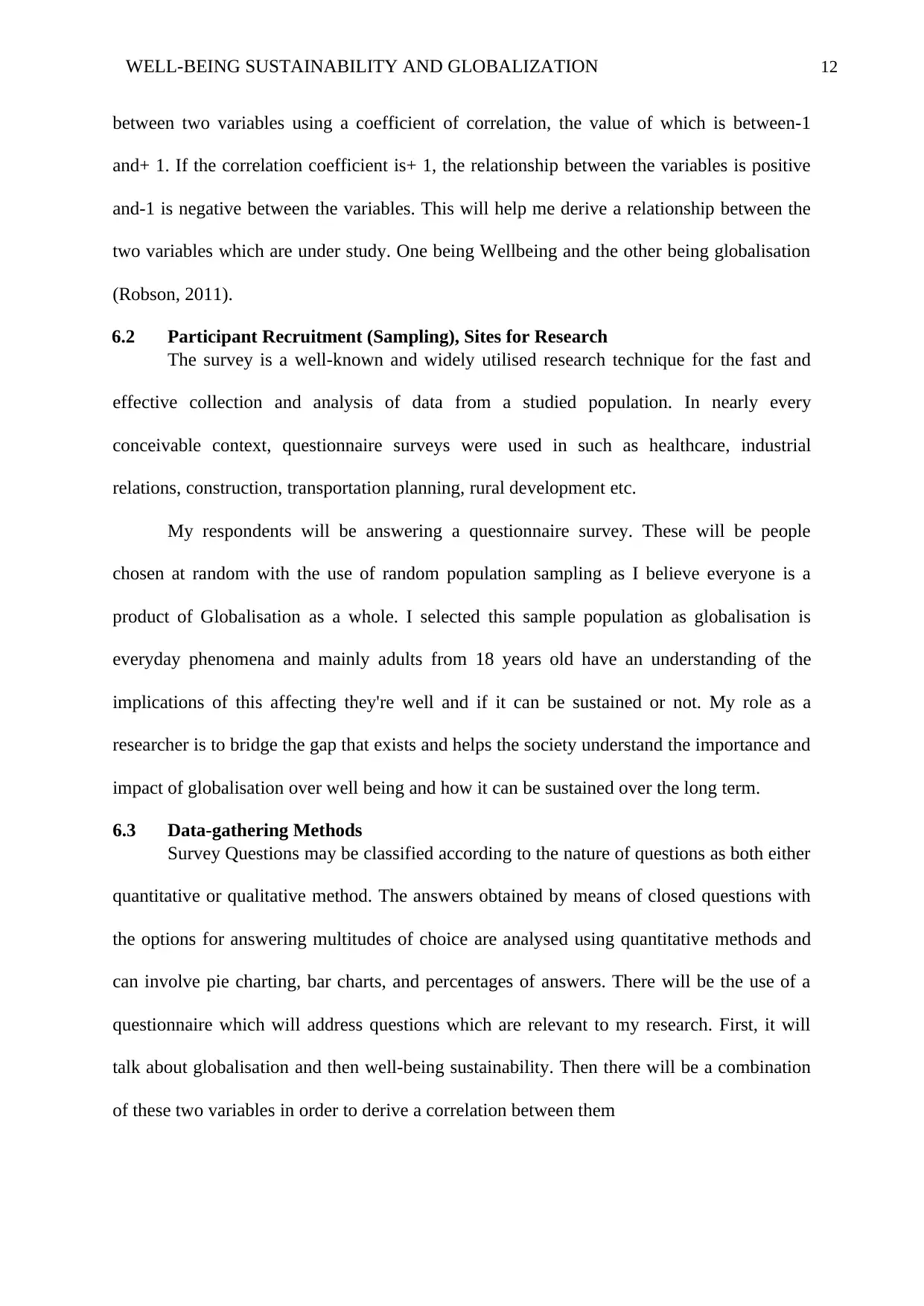
WELL-BEING SUSTAINABILITY AND GLOBALIZATION 12
between two variables using a coefficient of correlation, the value of which is between-1
and+ 1. If the correlation coefficient is+ 1, the relationship between the variables is positive
and-1 is negative between the variables. This will help me derive a relationship between the
two variables which are under study. One being Wellbeing and the other being globalisation
(Robson, 2011).
6.2 Participant Recruitment (Sampling), Sites for Research
The survey is a well-known and widely utilised research technique for the fast and
effective collection and analysis of data from a studied population. In nearly every
conceivable context, questionnaire surveys were used in such as healthcare, industrial
relations, construction, transportation planning, rural development etc.
My respondents will be answering a questionnaire survey. These will be people
chosen at random with the use of random population sampling as I believe everyone is a
product of Globalisation as a whole. I selected this sample population as globalisation is
everyday phenomena and mainly adults from 18 years old have an understanding of the
implications of this affecting they're well and if it can be sustained or not. My role as a
researcher is to bridge the gap that exists and helps the society understand the importance and
impact of globalisation over well being and how it can be sustained over the long term.
6.3 Data-gathering Methods
Survey Questions may be classified according to the nature of questions as both either
quantitative or qualitative method. The answers obtained by means of closed questions with
the options for answering multitudes of choice are analysed using quantitative methods and
can involve pie charting, bar charts, and percentages of answers. There will be the use of a
questionnaire which will address questions which are relevant to my research. First, it will
talk about globalisation and then well-being sustainability. Then there will be a combination
of these two variables in order to derive a correlation between them
between two variables using a coefficient of correlation, the value of which is between-1
and+ 1. If the correlation coefficient is+ 1, the relationship between the variables is positive
and-1 is negative between the variables. This will help me derive a relationship between the
two variables which are under study. One being Wellbeing and the other being globalisation
(Robson, 2011).
6.2 Participant Recruitment (Sampling), Sites for Research
The survey is a well-known and widely utilised research technique for the fast and
effective collection and analysis of data from a studied population. In nearly every
conceivable context, questionnaire surveys were used in such as healthcare, industrial
relations, construction, transportation planning, rural development etc.
My respondents will be answering a questionnaire survey. These will be people
chosen at random with the use of random population sampling as I believe everyone is a
product of Globalisation as a whole. I selected this sample population as globalisation is
everyday phenomena and mainly adults from 18 years old have an understanding of the
implications of this affecting they're well and if it can be sustained or not. My role as a
researcher is to bridge the gap that exists and helps the society understand the importance and
impact of globalisation over well being and how it can be sustained over the long term.
6.3 Data-gathering Methods
Survey Questions may be classified according to the nature of questions as both either
quantitative or qualitative method. The answers obtained by means of closed questions with
the options for answering multitudes of choice are analysed using quantitative methods and
can involve pie charting, bar charts, and percentages of answers. There will be the use of a
questionnaire which will address questions which are relevant to my research. First, it will
talk about globalisation and then well-being sustainability. Then there will be a combination
of these two variables in order to derive a correlation between them
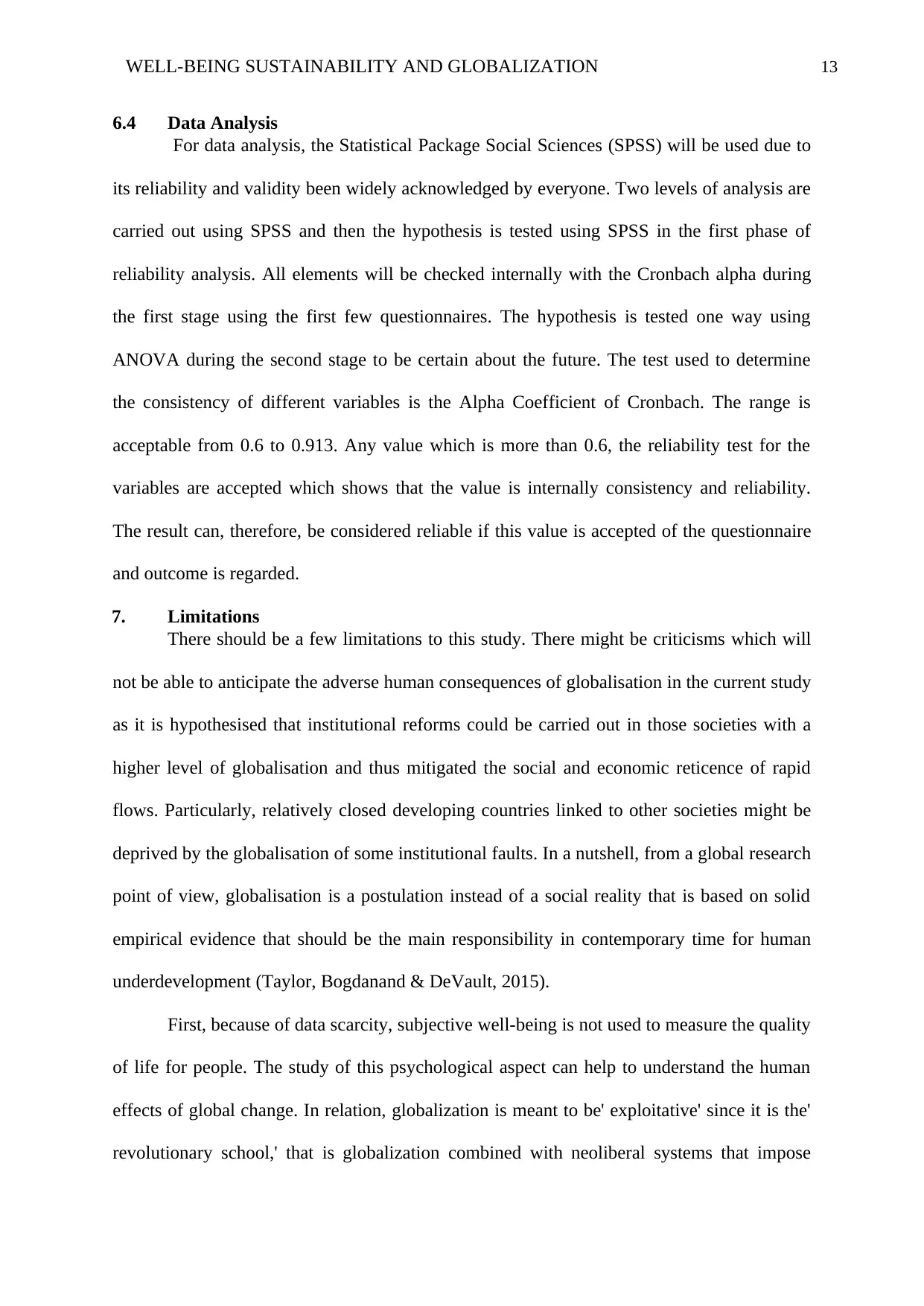
WELL-BEING SUSTAINABILITY AND GLOBALIZATION 13
6.4 Data Analysis
For data analysis, the Statistical Package Social Sciences (SPSS) will be used due to
its reliability and validity been widely acknowledged by everyone. Two levels of analysis are
carried out using SPSS and then the hypothesis is tested using SPSS in the first phase of
reliability analysis. All elements will be checked internally with the Cronbach alpha during
the first stage using the first few questionnaires. The hypothesis is tested one way using
ANOVA during the second stage to be certain about the future. The test used to determine
the consistency of different variables is the Alpha Coefficient of Cronbach. The range is
acceptable from 0.6 to 0.913. Any value which is more than 0.6, the reliability test for the
variables are accepted which shows that the value is internally consistency and reliability.
The result can, therefore, be considered reliable if this value is accepted of the questionnaire
and outcome is regarded.
7. Limitations
There should be a few limitations to this study. There might be criticisms which will
not be able to anticipate the adverse human consequences of globalisation in the current study
as it is hypothesised that institutional reforms could be carried out in those societies with a
higher level of globalisation and thus mitigated the social and economic reticence of rapid
flows. Particularly, relatively closed developing countries linked to other societies might be
deprived by the globalisation of some institutional faults. In a nutshell, from a global research
point of view, globalisation is a postulation instead of a social reality that is based on solid
empirical evidence that should be the main responsibility in contemporary time for human
underdevelopment (Taylor, Bogdanand & DeVault, 2015).
First, because of data scarcity, subjective well-being is not used to measure the quality
of life for people. The study of this psychological aspect can help to understand the human
effects of global change. In relation, globalization is meant to be' exploitative' since it is the'
revolutionary school,' that is globalization combined with neoliberal systems that impose
6.4 Data Analysis
For data analysis, the Statistical Package Social Sciences (SPSS) will be used due to
its reliability and validity been widely acknowledged by everyone. Two levels of analysis are
carried out using SPSS and then the hypothesis is tested using SPSS in the first phase of
reliability analysis. All elements will be checked internally with the Cronbach alpha during
the first stage using the first few questionnaires. The hypothesis is tested one way using
ANOVA during the second stage to be certain about the future. The test used to determine
the consistency of different variables is the Alpha Coefficient of Cronbach. The range is
acceptable from 0.6 to 0.913. Any value which is more than 0.6, the reliability test for the
variables are accepted which shows that the value is internally consistency and reliability.
The result can, therefore, be considered reliable if this value is accepted of the questionnaire
and outcome is regarded.
7. Limitations
There should be a few limitations to this study. There might be criticisms which will
not be able to anticipate the adverse human consequences of globalisation in the current study
as it is hypothesised that institutional reforms could be carried out in those societies with a
higher level of globalisation and thus mitigated the social and economic reticence of rapid
flows. Particularly, relatively closed developing countries linked to other societies might be
deprived by the globalisation of some institutional faults. In a nutshell, from a global research
point of view, globalisation is a postulation instead of a social reality that is based on solid
empirical evidence that should be the main responsibility in contemporary time for human
underdevelopment (Taylor, Bogdanand & DeVault, 2015).
First, because of data scarcity, subjective well-being is not used to measure the quality
of life for people. The study of this psychological aspect can help to understand the human
effects of global change. In relation, globalization is meant to be' exploitative' since it is the'
revolutionary school,' that is globalization combined with neoliberal systems that impose
Paraphrase This Document
Need a fresh take? Get an instant paraphrase of this document with our AI Paraphraser
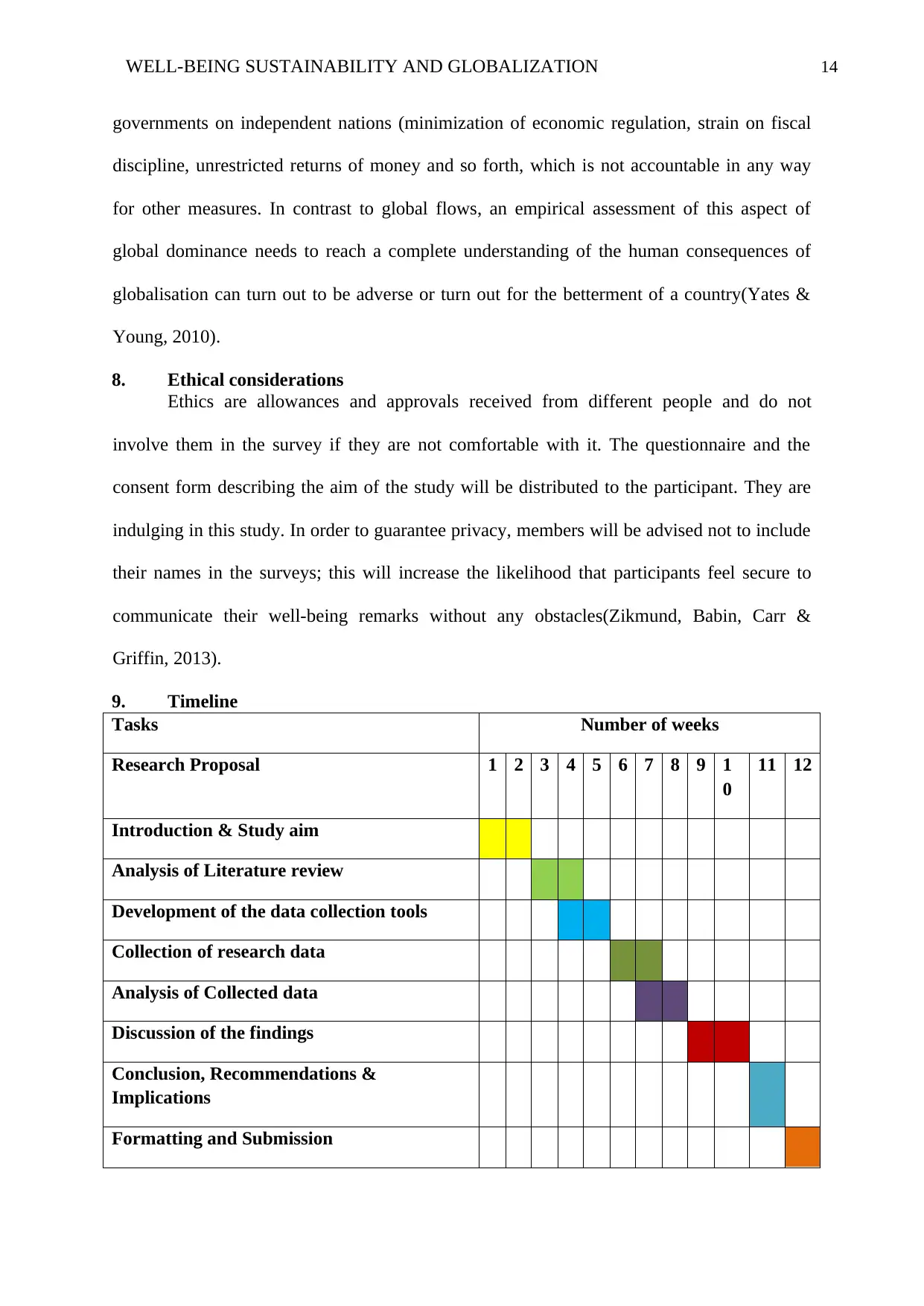
WELL-BEING SUSTAINABILITY AND GLOBALIZATION 14
governments on independent nations (minimization of economic regulation, strain on fiscal
discipline, unrestricted returns of money and so forth, which is not accountable in any way
for other measures. In contrast to global flows, an empirical assessment of this aspect of
global dominance needs to reach a complete understanding of the human consequences of
globalisation can turn out to be adverse or turn out for the betterment of a country(Yates &
Young, 2010).
8. Ethical considerations
Ethics are allowances and approvals received from different people and do not
involve them in the survey if they are not comfortable with it. The questionnaire and the
consent form describing the aim of the study will be distributed to the participant. They are
indulging in this study. In order to guarantee privacy, members will be advised not to include
their names in the surveys; this will increase the likelihood that participants feel secure to
communicate their well-being remarks without any obstacles(Zikmund, Babin, Carr &
Griffin, 2013).
9. Timeline
Tasks Number of weeks
Research Proposal 1 2 3 4 5 6 7 8 9 1
0
11 12
Introduction & Study aim
Analysis of Literature review
Development of the data collection tools
Collection of research data
Analysis of Collected data
Discussion of the findings
Conclusion, Recommendations &
Implications
Formatting and Submission
governments on independent nations (minimization of economic regulation, strain on fiscal
discipline, unrestricted returns of money and so forth, which is not accountable in any way
for other measures. In contrast to global flows, an empirical assessment of this aspect of
global dominance needs to reach a complete understanding of the human consequences of
globalisation can turn out to be adverse or turn out for the betterment of a country(Yates &
Young, 2010).
8. Ethical considerations
Ethics are allowances and approvals received from different people and do not
involve them in the survey if they are not comfortable with it. The questionnaire and the
consent form describing the aim of the study will be distributed to the participant. They are
indulging in this study. In order to guarantee privacy, members will be advised not to include
their names in the surveys; this will increase the likelihood that participants feel secure to
communicate their well-being remarks without any obstacles(Zikmund, Babin, Carr &
Griffin, 2013).
9. Timeline
Tasks Number of weeks
Research Proposal 1 2 3 4 5 6 7 8 9 1
0
11 12
Introduction & Study aim
Analysis of Literature review
Development of the data collection tools
Collection of research data
Analysis of Collected data
Discussion of the findings
Conclusion, Recommendations &
Implications
Formatting and Submission
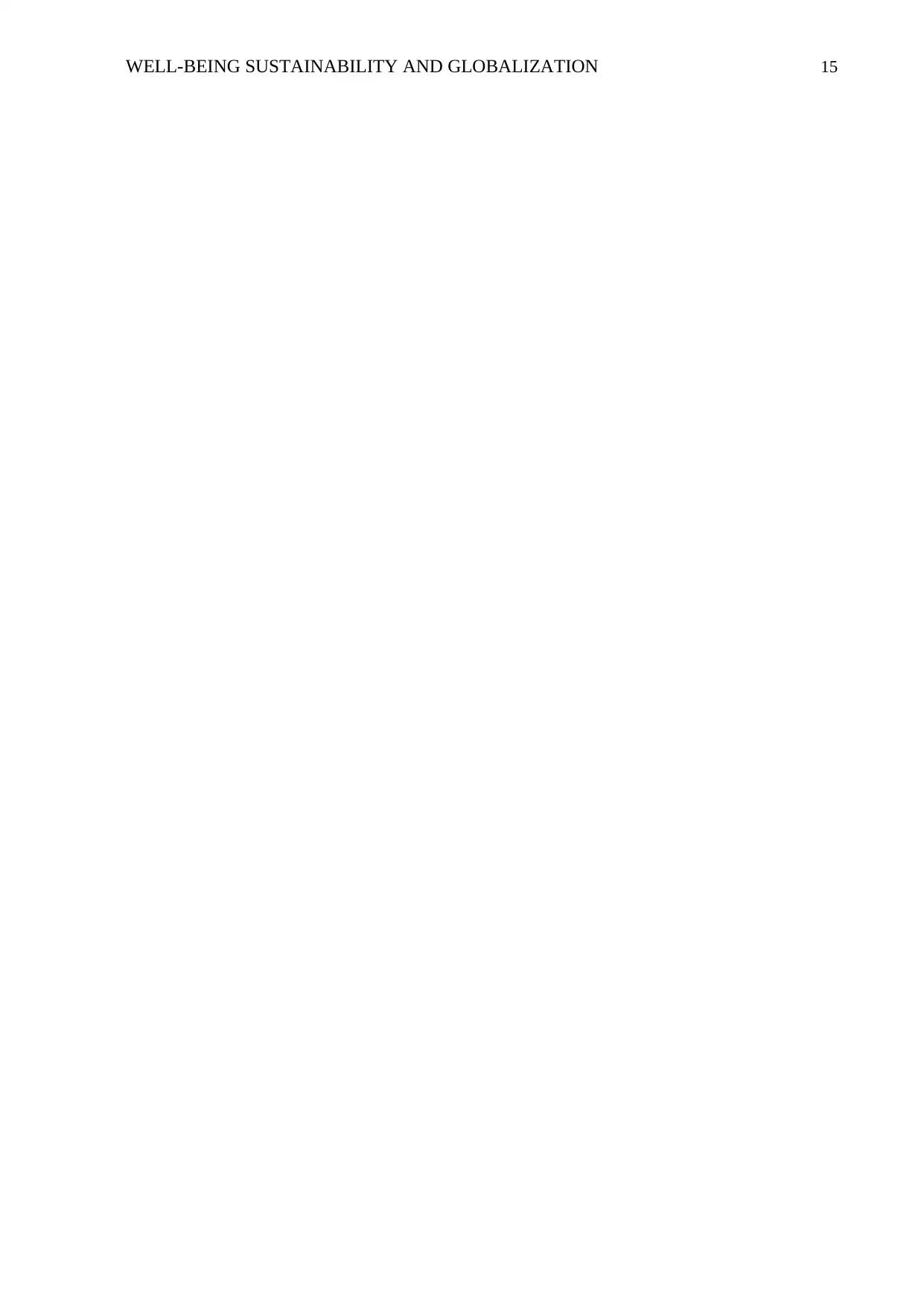
WELL-BEING SUSTAINABILITY AND GLOBALIZATION 15
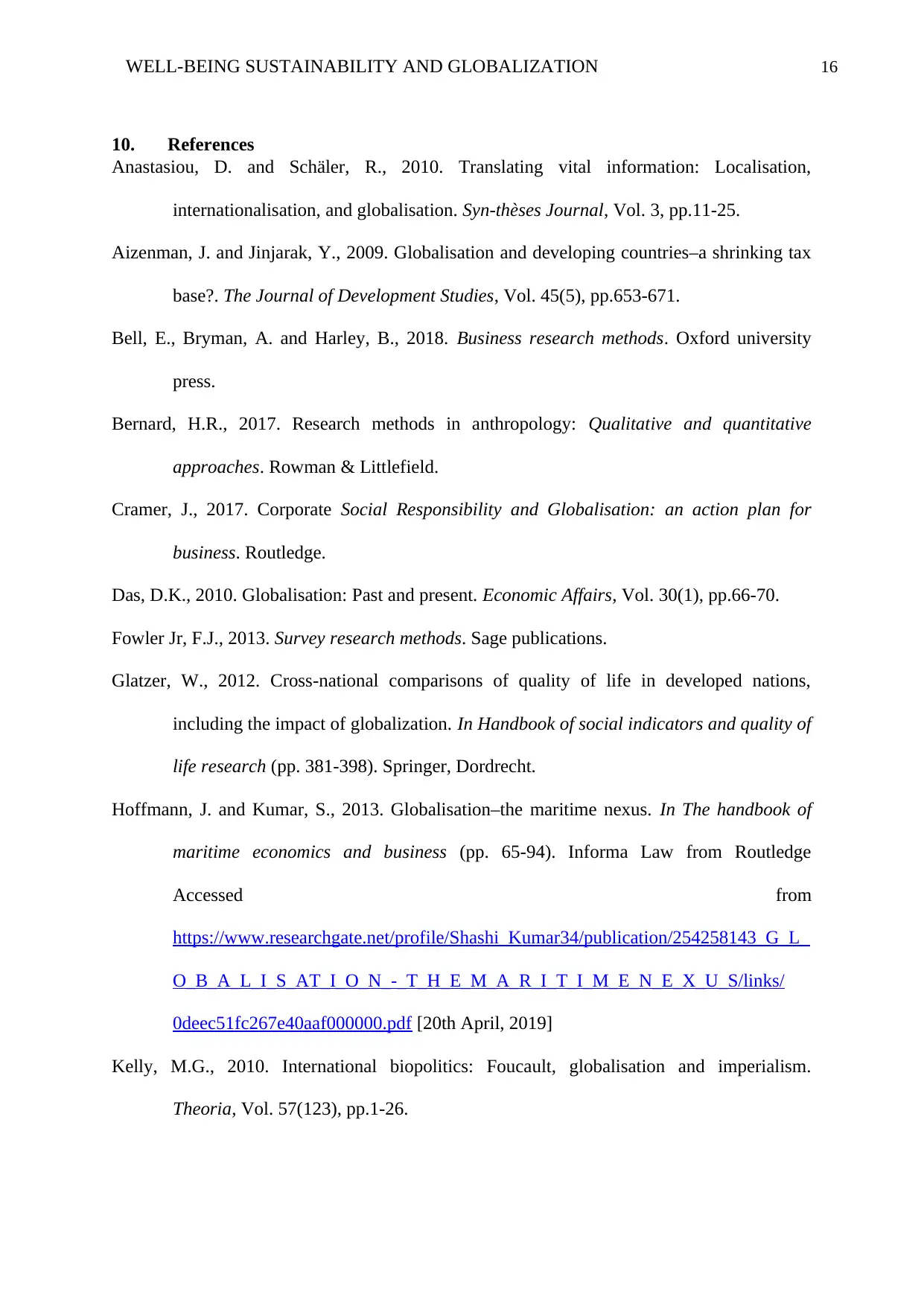
WELL-BEING SUSTAINABILITY AND GLOBALIZATION 16
10. References
Anastasiou, D. and Schäler, R., 2010. Translating vital information: Localisation,
internationalisation, and globalisation. Syn-thèses Journal, Vol. 3, pp.11-25.
Aizenman, J. and Jinjarak, Y., 2009. Globalisation and developing countries–a shrinking tax
base?. The Journal of Development Studies, Vol. 45(5), pp.653-671.
Bell, E., Bryman, A. and Harley, B., 2018. Business research methods. Oxford university
press.
Bernard, H.R., 2017. Research methods in anthropology: Qualitative and quantitative
approaches. Rowman & Littlefield.
Cramer, J., 2017. Corporate Social Responsibility and Globalisation: an action plan for
business. Routledge.
Das, D.K., 2010. Globalisation: Past and present. Economic Affairs, Vol. 30(1), pp.66-70.
Fowler Jr, F.J., 2013. Survey research methods. Sage publications.
Glatzer, W., 2012. Cross-national comparisons of quality of life in developed nations,
including the impact of globalization. In Handbook of social indicators and quality of
life research (pp. 381-398). Springer, Dordrecht.
Hoffmann, J. and Kumar, S., 2013. Globalisation–the maritime nexus. In The handbook of
maritime economics and business (pp. 65-94). Informa Law from Routledge
Accessed from
https://www.researchgate.net/profile/Shashi_Kumar34/publication/254258143_G_L_
O_B_A_L_I_S_AT_I_O_N_-_T_H_E_M_A_R_I_T_I_M_E_N_E_X_U_S/links/
0deec51fc267e40aaf000000.pdf [20th April, 2019]
Kelly, M.G., 2010. International biopolitics: Foucault, globalisation and imperialism.
Theoria, Vol. 57(123), pp.1-26.
10. References
Anastasiou, D. and Schäler, R., 2010. Translating vital information: Localisation,
internationalisation, and globalisation. Syn-thèses Journal, Vol. 3, pp.11-25.
Aizenman, J. and Jinjarak, Y., 2009. Globalisation and developing countries–a shrinking tax
base?. The Journal of Development Studies, Vol. 45(5), pp.653-671.
Bell, E., Bryman, A. and Harley, B., 2018. Business research methods. Oxford university
press.
Bernard, H.R., 2017. Research methods in anthropology: Qualitative and quantitative
approaches. Rowman & Littlefield.
Cramer, J., 2017. Corporate Social Responsibility and Globalisation: an action plan for
business. Routledge.
Das, D.K., 2010. Globalisation: Past and present. Economic Affairs, Vol. 30(1), pp.66-70.
Fowler Jr, F.J., 2013. Survey research methods. Sage publications.
Glatzer, W., 2012. Cross-national comparisons of quality of life in developed nations,
including the impact of globalization. In Handbook of social indicators and quality of
life research (pp. 381-398). Springer, Dordrecht.
Hoffmann, J. and Kumar, S., 2013. Globalisation–the maritime nexus. In The handbook of
maritime economics and business (pp. 65-94). Informa Law from Routledge
Accessed from
https://www.researchgate.net/profile/Shashi_Kumar34/publication/254258143_G_L_
O_B_A_L_I_S_AT_I_O_N_-_T_H_E_M_A_R_I_T_I_M_E_N_E_X_U_S/links/
0deec51fc267e40aaf000000.pdf [20th April, 2019]
Kelly, M.G., 2010. International biopolitics: Foucault, globalisation and imperialism.
Theoria, Vol. 57(123), pp.1-26.
Secure Best Marks with AI Grader
Need help grading? Try our AI Grader for instant feedback on your assignments.
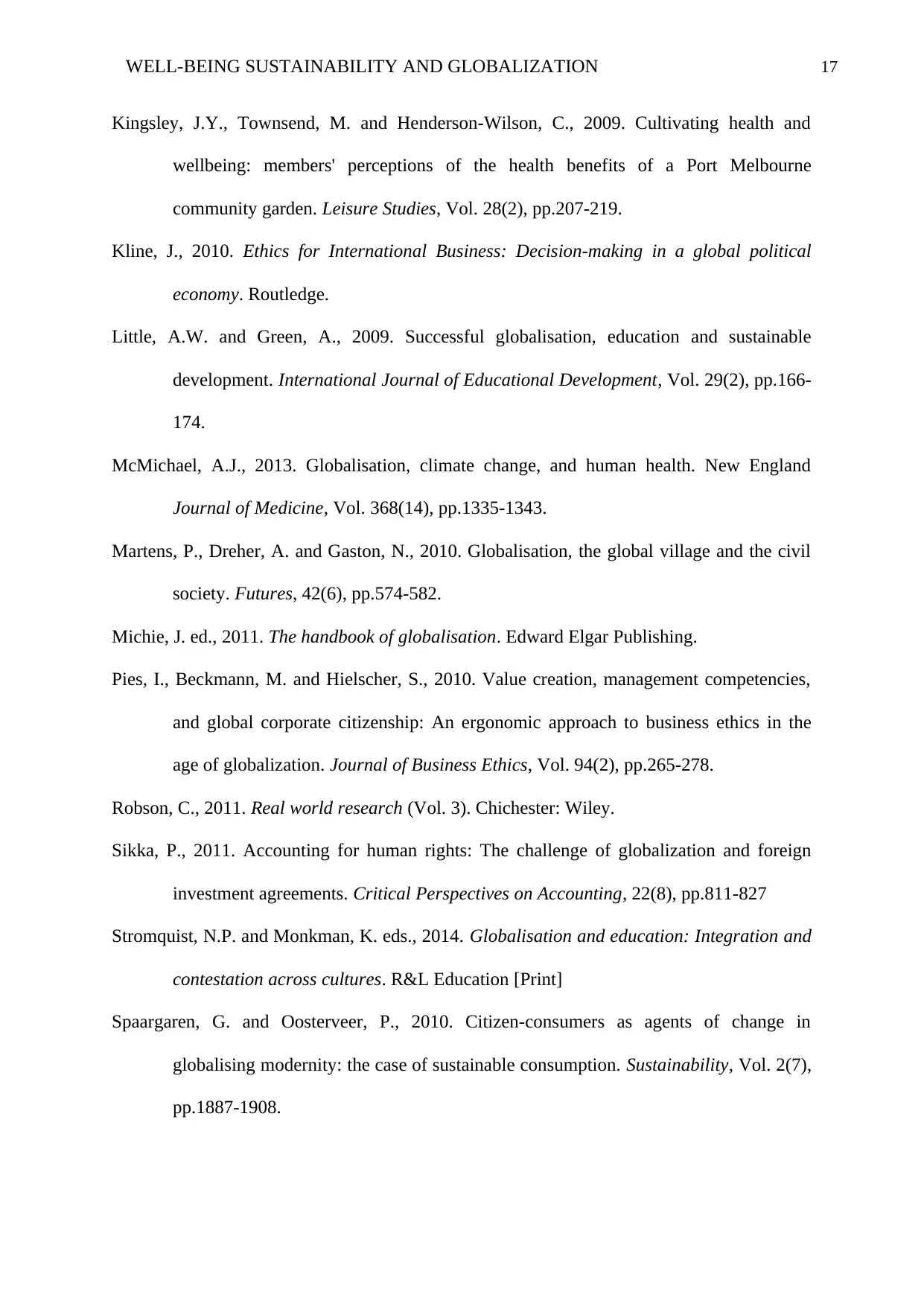
WELL-BEING SUSTAINABILITY AND GLOBALIZATION 17
Kingsley, J.Y., Townsend, M. and Henderson‐Wilson, C., 2009. Cultivating health and
wellbeing: members' perceptions of the health benefits of a Port Melbourne
community garden. Leisure Studies, Vol. 28(2), pp.207-219.
Kline, J., 2010. Ethics for International Business: Decision-making in a global political
economy. Routledge.
Little, A.W. and Green, A., 2009. Successful globalisation, education and sustainable
development. International Journal of Educational Development, Vol. 29(2), pp.166-
174.
McMichael, A.J., 2013. Globalisation, climate change, and human health. New England
Journal of Medicine, Vol. 368(14), pp.1335-1343.
Martens, P., Dreher, A. and Gaston, N., 2010. Globalisation, the global village and the civil
society. Futures, 42(6), pp.574-582.
Michie, J. ed., 2011. The handbook of globalisation. Edward Elgar Publishing.
Pies, I., Beckmann, M. and Hielscher, S., 2010. Value creation, management competencies,
and global corporate citizenship: An ergonomic approach to business ethics in the
age of globalization. Journal of Business Ethics, Vol. 94(2), pp.265-278.
Robson, C., 2011. Real world research (Vol. 3). Chichester: Wiley.
Sikka, P., 2011. Accounting for human rights: The challenge of globalization and foreign
investment agreements. Critical Perspectives on Accounting, 22(8), pp.811-827
Stromquist, N.P. and Monkman, K. eds., 2014. Globalisation and education: Integration and
contestation across cultures. R&L Education [Print]
Spaargaren, G. and Oosterveer, P., 2010. Citizen-consumers as agents of change in
globalising modernity: the case of sustainable consumption. Sustainability, Vol. 2(7),
pp.1887-1908.
Kingsley, J.Y., Townsend, M. and Henderson‐Wilson, C., 2009. Cultivating health and
wellbeing: members' perceptions of the health benefits of a Port Melbourne
community garden. Leisure Studies, Vol. 28(2), pp.207-219.
Kline, J., 2010. Ethics for International Business: Decision-making in a global political
economy. Routledge.
Little, A.W. and Green, A., 2009. Successful globalisation, education and sustainable
development. International Journal of Educational Development, Vol. 29(2), pp.166-
174.
McMichael, A.J., 2013. Globalisation, climate change, and human health. New England
Journal of Medicine, Vol. 368(14), pp.1335-1343.
Martens, P., Dreher, A. and Gaston, N., 2010. Globalisation, the global village and the civil
society. Futures, 42(6), pp.574-582.
Michie, J. ed., 2011. The handbook of globalisation. Edward Elgar Publishing.
Pies, I., Beckmann, M. and Hielscher, S., 2010. Value creation, management competencies,
and global corporate citizenship: An ergonomic approach to business ethics in the
age of globalization. Journal of Business Ethics, Vol. 94(2), pp.265-278.
Robson, C., 2011. Real world research (Vol. 3). Chichester: Wiley.
Sikka, P., 2011. Accounting for human rights: The challenge of globalization and foreign
investment agreements. Critical Perspectives on Accounting, 22(8), pp.811-827
Stromquist, N.P. and Monkman, K. eds., 2014. Globalisation and education: Integration and
contestation across cultures. R&L Education [Print]
Spaargaren, G. and Oosterveer, P., 2010. Citizen-consumers as agents of change in
globalising modernity: the case of sustainable consumption. Sustainability, Vol. 2(7),
pp.1887-1908.

WELL-BEING SUSTAINABILITY AND GLOBALIZATION 18
Taylor, S.J., Bogdan, R. and DeVault, M., 2015. Introduction to qualitative research methods:
A guidebook and resource. John Wiley & Sons.
Yates, L. and Young, M., 2010. Globalisation, knowledge and the curriculum. European
Journal of Education, pp.4-10.
Zikmund, W.G., Babin, B.J., Carr, J.C. and Griffin, M., 2013. Business research methods.
Cengage Learning.
Taylor, S.J., Bogdan, R. and DeVault, M., 2015. Introduction to qualitative research methods:
A guidebook and resource. John Wiley & Sons.
Yates, L. and Young, M., 2010. Globalisation, knowledge and the curriculum. European
Journal of Education, pp.4-10.
Zikmund, W.G., Babin, B.J., Carr, J.C. and Griffin, M., 2013. Business research methods.
Cengage Learning.
1 out of 18
Related Documents
Your All-in-One AI-Powered Toolkit for Academic Success.
+13062052269
info@desklib.com
Available 24*7 on WhatsApp / Email
![[object Object]](/_next/static/media/star-bottom.7253800d.svg)
Unlock your academic potential
© 2024 | Zucol Services PVT LTD | All rights reserved.





